#High Speculation
Explore tagged Tumblr posts
Text
Flemeth / Mythal (part 2)

Flemeth is an enigmatic character along the series that seems to be related to the whole plot of Dragon Age since DAO. In the present post I will try to collect all the relevant information about her and about what she says, since she is one of the characters that I think we can rely more when it comes to digging the "truth" behind the DA lore.
The current post has the following bolded sections:
Flemeth in DAO
Story of Conobar and Osen
Flemeth in DA2
Flemeth in DAI
Mythal as an Elvhenan Goddess
Mythal as a Changed Goddess
Flemeth and Mythal
Mythal and the Well of Sorrows
Flemeth and the Music
Flemeth, Mythal, and Motherhood
Artwork of Flemeth
Flemeth in the books (or comics)
Conclusions
Flemeth and Mythal
If Kieran doesn't exist, the Inquisitor who drank from the Well will stop Morrigan from attacking Flemeth when she appears. However, if Kieran exists, Flemeth claims in this situation: "You will endanger the boy" meaning that this power she is planning to use may hurt him. It's hard to know if this is just a comment she does, a display of Mythal's motherhood, or simply a way to piss Morrigan off.
In another fragment of this scene, we have a cryptic explanation of how Flemeth can contain Mythal:
“Once I was but a woman, crying out in the lonely darkness for justice. And she came to me, a wisp of an ancient being, and she granted me all I wanted and more. I have carried Mythal through the ages ever since, seeking the justice denied to her. […] She is a part of me, no more separe than your heart from your chest." [...] "But what was Mythal? A legend given name and called a god, or something more? Truth is not the end, but a beginning.”
It's fair to question if this "ancient being" could not be a demon, as the Inquisitor says at some point. However, the voices of the Well say that Flemeth speaks the Truth. So, can we be [more or less] sure that Flemeth is not possessed by a demon? I personally have some issues about the accuracy and the reliability of the voices of the Well, because we know they are controlled by Mythal herself [read section below].
Flemeth also gives us room to wonder about who and what Mythal was. The fact she is cryptically telling us that Mythal was more than any other Evanuris makes me suspect and support the theory that Mythal is the one with double nature [instead of Fen'Harel], she is Evanuris and Forgotten One, and the Forgotten Ones were dragons that Evanuris and Elvhenan worshipped before claiming Divinity for themselves [details in Attempt to rebuild Ancient Elvhenan History or in The Missing]
Flemeth: A herald, indeed. Shouting to the heavens, harbinger of a new age. As for me, I have had many names. But you... may call me Flemeth. Inquisitor: Flemeth appears in other legends, helping heroes for reasons of her own F: I nudge history, when it’s required. Other times, a shove is needed. [chuckles]
These pieces of information also tell us and reinforce what we saw in DAO and DA2: Flemeth meddles with human history so the events go to a direction she wants. It's not clear what goal is behind all this, but I think it's fair to conclude she is preparing what she promised to Mythal: avenge her, a reckoning that will shake the very heavens.
When Morrigan claims that Flemeth "prolongs her unnatural life by possessing the bodies of her daughters" Flemeth answers
Flemeth: That's what you believe, is it? Morrigan: I found your grimoire, and I am no fool, old woman Flemeth: [chuckles] Yet here you stand, bound into my service. My daughter ran from me long ago. I've let her be... until now, it seems.
Again, we have no clear answer about the process that allowed Flemeth to live so much or if it is this body the one that lived for centuries, but considering the piece of information we obtained from Yavanna in the comic The Silent Grove, I think it's fair to assume that is not Flemeth who is living through different bodies, but Mythal, who is so entangled with Flemeth's soul that now they are one single entity. Flemeth told us before that Mythal and herself are one thing. This concept is also reinforced when we speak with Anders in DA2 about his possessed condition: It's impossible to determine when Anders finishes and Justice starts. They are one now. However, this brings into account a sharp observation: we don't see this same condition in Kieran.
Do Flemeth and Kieran suffered similar possession condition? If Kieran has the power of an Old God, he will be called by Mythal in dreams, activate the Eluvian by his own, and walk into the Fade [The Fade - Flemeth: Part 1, Part 2]. Morrigan will say "To direct the eluvian here would require immense power". This fact shows us that Flemeth/Mythal shares similar powers to Urthemiel [the soul inside Kieran] since she is in the Fade by herself. This would support a little bit the idea I've been exploring long ago about the Forgotten Ones being dragons, and Mythal being one of them; the actual real Evanuris who is Evanuris and Forgotten One at the same time [and not Fen'Harel, as the unreliable Dalish Legends repeat] since in the comic Until We Sleep we learn that the Great Dragons had absolute control of the Fade [dreamer/somniari's powers-like].
Kieran: I'm sorry mother. I heard her calling to me. She said now was the time . Morrigan [to Flemeth]: Then what is it you want? Felemeth, looking at Kieran: One thing and one thing only. Kieran: I have to go, mother. Flemeth: He carries a piece of what once was, snatched from the jaws of darkness. You know this. Morrigan: He is not your pawn, mother. I will not let you use him. Flemeth: Have you not used him? Was that not your purpose, the reason you agreed to his creation? Morrigan: That was then. Now he... he is my son. [Flemeth tilts her head, curious, as if she was surprised of a response she was not expecting]
From this exchange we see again how Mythal is deeply related to the Old Gods. Even though we don't know the reason why she calls Urthemiel nor why or for what there is no time, we can see that Mythal has some level of command over Urthemiel.
We also see once more the concept of "Darkness", as a metaphoric word to mean "The Blight".
And finally, the whole scene seems to encourage the suspicion that Flemeth has been testing Morrigan's sense of motherhood, which again makes some sense: thanks to the Dev's notes in Somewhere in the Crossroads, The Silent Grove comic, and Kieran's words about the inheritor of a new age, we know Flemeth has been raising Morrigan to become the next Inheritor. We can assume it means she will be the inheritor of Myhtal's godhood, who may need some sense of motherhood in her willingly host, maybe?
Morrigan: Flemeth extends her life by possessing the bodies of her daughters'. That was the fate she intended for me. I thwarted her, and now she intends to have Kieran instead. Inquisitor: The way she talked about Kieran... Flemeth: I am not the only one carrying the soul of a being long thought lost. Morrigan: He is more than that, Mother. Flemeth: As am I, yet do you hear me complain? Our destinies are not so easily avoided, dear girl. [...] Inquisitor: If Kieran is so special, why did you wait until now to come for him? Flemeth: I did not know where he was. Morrigan cleverly hid him from me... until now Morrigan: T'was the well... Flemeth: Always grasping beyond your reach, despite all what I taught you.
Flemeth seems to compare herself to Kieran in nature and destinies: souls of old creatures that were considered gone, that remain entangled with the soul of the body they inhabit, and have a particular destiny to fulfil [which is unknown to us].
Another curious thing: even though Flemeth has enormous power, specially in the Fade, she was unable to locate Kieran for a long time. Only when someone drank from the Well she was able to do so. We know that Morrigan lived with Kieran in the spaces in-between for a long time [the Crossroads], so we can assume that these spaces are not connected to the Fade and certainly Evanuris can't perceive it. Again, we learnt about the nature of these spaces in-between in The Crossroads [DLC Trespasser]: Elven Mountain Ruins, where the freed slaves tried to recover and hide from the Evanuris while gathering strength against them.
Inquisitor: You're... going to steal the body of a young boy? Flemeth: If my daughter believes it, that it must be so. [...] My daughter struggles. I expected no less of her.
Again, we see Mythal cannot care less to explain, and lets Morrigan to believe whatever she wants to. This coincides with what Flemeth told us in a previous scene: humans don't want the truth, and that's the true nature of their hearts. So, her approach is always “I will let you believe what you want to believe” and does nothing to make you change of opinion. In DAO, however, we find that she claims that the only wise attitude is to doubt about everything [Read DAO section in Part 1].
Mythal and the Well of Sorrows
If Morrigan drank from the Well of Sorrows:
Inquisitor: This meeting was not accident, was it? Flemeth: Clever lad/lass Morrigan: The voices.... came from you? Flemeth: The price of the Well seemed no dire thing when you saw so much gain, hmn?
If the Inquisitor drank from the Well of Sorrows:
Inquisitor: This meeting was not accident, was it? The voices from the well directed me here, and you direct them. Flemeth: Clever lad
This is also an important piece of lore: the Well of Sorrows, which gathers all the knowledge of all the high priests that served Mythal, and left their "will" in it [read Abelas' words about the concept of "will" that he lets transpire in Temple of Mythal-Part 5], are also controlled by Mythal. So this Well is not entirely a reliable independent source of information, it's as reliable as Flemeth wants it to be.
Inquisitor [If they drank from the Well]: So must I serve you now because I drank from the Well? Flemeth [chuckles]: Is that how you see yourself? A servant? I have no command for you. Not yet. Inquisitor [If Morrigan drank from the Well]: did you come here to make Morrigan serve you? Flemeth: [laughs] oh, what a servant she would make.
This piece continues supporting Abelas' words about Mythal's followers not being slave/servants against their will. Flemeth is amused to see how heavily the Inquisitor sees this position towards her, she jokes and laughs about it, and claims that there is no commands for the inquisitor. "Not yet", since she is also Flemeth, who will avenge Mythal, and will use any tool she can use to do so.
Flemeth: I wished to see who drank from the Well of Sorrows. It has been a very long time. [chuckle, if Morrian drank from it] Imagine my surprise to discover it was you. [if the Inquisitor drank it] Now I have, and he/she is free to go. Morrigan: and that's all? Flemeth: A soul is not forced upon the unwilling, Morrigan. You were never in danger from me.
This again shows how Mythal is not really fond of unwilling servants. She lets Morrigan/the Inquisitor free. And then, she claims that souls cannot be forced upon the unwilling. This line, as cryptic as anything that Flemeth says, seems to imply two things: Mythal never wanted slaves, but loyal followers. And if it's true that Flemeth's long life is because she transferred Mythal to her daughters, it should not be a process forced upon an unwilling host. Thanks to Yavanna in The Silent Grove, we suspect that Flemeth wanted Morrigan to be the next carrier of Mythal's fragment. Due to the Dev's note in Somewhere in the Crossroads, we confirm that Flemeth wanted this, and we suspect it is what she places in the Mirror before being consumed by Solas. Although if Solas took that piece of power/godhood, makes little sense to assume the same fragment was placed on the mirror, unless Mythal can divide that divine power [which is something she can do to some extent according to all what she told us about being a fragment of a whole]. In any case, we also know that Flemeth lets Morrigan/the Inquisitor free because she knows she will die soon at the hands of Solas [as the Dev's note in Somewhere in the Crossroads seems to confirm].
In the next scene, when the Inquisitor controls the dragon guardian of the altar, we see that, visually speaking, they use the same power that Flemeth cast on the one who drank from the well. So it seems to imply that the Inquisitor can control this dragon like Flemeth can control anyone who drank from the well.
Flemeth and the music:
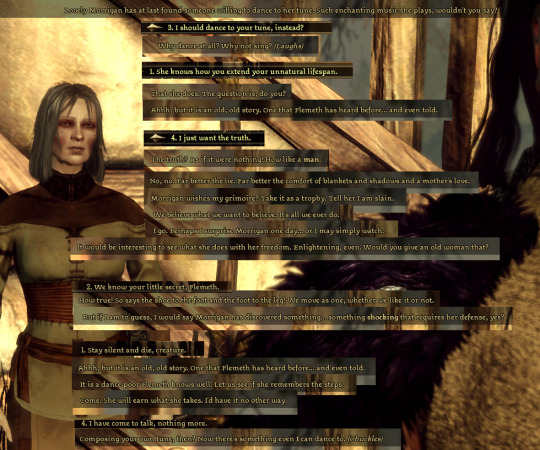
It’s in DAO when we start seeing that Flemeth has a soft pattern of a music theme in her speech. When you find Flemeth for a second time, due to Morrigan’s personal quest, she speaks of “Morrigan’s music” as if it were a metaphor for Morrigan's manipulation. This image also brings us an analogy with the Blight and its sweet song, which manipulates blighted creatures into looking for Archdemons to awaken them [or most likely, to open the gates that keep trapped the entity in the Black City, the true origin of the song, according to Avernus in Soldier’s Peak]
Flemeth sounds very “done with” this potential assassination of her, again. This repeated situation where she sees that the ones she helped once return to kill her, may have given Mythal a bad taste in her mouth. In fact, she adds “It’s an old, old story [that Flemeth] even told. It’s a dance poor Flemeth knows well”, referring to Mythal’s. Back then, when we were playing DAO, it was impossible for us to understand the underlying meaning of these words even though we could notice there was something else. Now, thanks to DAI, all these lines are much clearer.
She doesn’t say the truth behind all this situation even if we ask her to do so simply because she knows the heart of humans: they do not want the Truth [this line was said in DAI], and she knows they prefer the comfort of the lies instead. “We believe what we want to believe”. Flemeth, then, turns into a Dragon and fights us if we choose that option. Only when we pick this option we can be sure she becomes a dragon. Up to that moment, we were hinted by Morrigan that Flemeth had polymorphed into a big unspecified creature and grabbed the Warden and Alistair in her talons.
Another reference to music that Flemeth uses appears in DAI:
Flemeth: You seek to preserve the powers that were, but to what end? It is because I taught you, girl, because things happened that were never meant to happen. She was betrayed as I was betrayed - as the world was betrayed! Mythal clawed and crawled her way through the ages to me, and I will see her avenged! Alas, so long as the music plays, we dance.
And considering the post Songs and elements that sing and whisper in DA Lore, we can agree that this line seems pretty curious and it almost allows us to link Flemeth's incoming avenge of Mythal with the Blighted song, specially if we explore all the hypothesis that sprouted in Speculations about the Vinyl Art.
Flemeth, Mythal, and Motherhood
The concept of Motherhood in Flemeth is controversial at best. Without going into a deep judgement of her character, we need to remember particular bits of lore and concepts we know about Mythal.
Mythal was always related to motherhood. It's not only something that is present in the unreliable Dalish legends, it's something we see clearly in the Temple of Mythal, and in her Mosaic [read Myhtal's section in the post Evanuris] and in Ancient Elven codices, Temple of Mythal or Ancient Elven codices; Vir Dirthara.
In DAO, Flemeth--as the owner of a fragment of Mythal--is presented too explicitly as a witch that will possess Morrigan, questioning her genuine sense of motherhood. I think DAO had a poor presentation of a "misinterpretation", clarified later in DAI, simply because in DAO, at the end of Morrigan's Quest, there are two questionable items: Flemeth's Grimoire and "Robes of Possesion",
The grimoire doesn't say anything relevant in its description and all what we learn about it comes from Morrigan's perspective, who understands it very wrongly. But the robe has a straightforward description:
"The original intent of these robes is clear: a "welcome home" present from Flemeth, designed to sap Morrigan's will and ease the ancient sorceress's possession of her daughter. With Flemeth dead, these robes no longer pose a danger to Morrigan--but Maker help those who get in her way."
Again, this vision is after reading the grimoire and trusting Morrigan's interpretation. This item has -1 will, which seems to be very contradictory to what Flemeth claimed in DAI: "A soul is not forced upon the unwilling, you were never in danger from me" which means, in my opinion, three situations happened in all those years in between games:
Or DAO had a different idea about what to do with Flemeth originally and it changed over the years [very likely],
Or this robe is a bad designed red herring [they are lying to the player to avoid spoiling the concept of Mythal in Flemeth]
Or there is a real lore-wise explanation of this that needs a re-interpretation of the grimoire without the biases that Morrigan had acquired along her life. Maybe a re-read of this item with the Well of Sorrow's wisdom may enlighten us differently. However, this is speculation and we can't do it ingame.
We know that Yavanna in the comic The Silent Grove claims that Morrigan doesn't understand what Flemeth is doing, and apparently, what she will receive from her is a "gift", not unwillingly possession.
Kieran, if he has the old soul, will claim that Morrigan is the "inheritor" of the new age, which aligns with what Yavanna implies and the Dev's notes in DAI say: what Flemeth was trying to do is to give Morrigan the "essence of godhood, a gift that Morrigan misunderstood as hostile possession", read Somewhere in the Crossroads [Ending] for details.
The presentation of this issue in DAO makes us wonder a lot about Flemeth's sense of motherhood. On the other side, thanks to DAI, we know that Mythal was changed in a way that she abandoned her Children [the People she always seems to be so fond of], because "things happened that were never meant to happen". In DA2 and DAI we find that Mythal is also presented and perceived as a goddess that protects, with some degree of Motherhood, but also abandonment [especially in DAI]: She also abandoned Abelas and his people, as the new generations of guardians lose they deep devotion to Mythal [read Untranslatable Elven Writing, from Ancient Elven codices, Temple of Mythal] .
On the other hand, we lack of context. We don't know how Mythal was killed, if it was due to a betrayal from the Evanuris because she trusted them, and why she raised Morrigan harder than she should have.
Even though this Mythal is changed and has a questionable sense of motherhood, we see in DAI a motherhood test: when Morrigan tells Flemeth to leave her son and take her instead, Flemeth takes Urthemiel's fragment and leaves them both alone. Later, Morrigan will claim this was a test she was not sure she had passed.
[Kieran looks at Flemeth] Flemeth: As you wish. [She looks at Morrigan] Hear my proposal, dear girl. Let me take the lad, and you are free of me forever. I will never interfere with or harm you again. Or, keep the lad with you... and you will never be safe from me. I will have my due. Morrigan: I will take my chances. Flemeth: I found you once, girl. What makes you think I will not find you again? Morrigan Take over my body now, if you must. Just let Kieran go. He will be better off without me, just as I was better off without you. [Flemeth seems to make a face of hurt, as if those words reached her. Then, she looks at Kieran, and it seems to look like they can communicate in silence. Then she smiles at him as a blue glow passes from Kieran's body to Flemeth's] Kieran: No more dreams? Flemeth: No more dreams. [As Kieran returns to his mother] A soul is not forced upon the unwilling, Morrigan. You were never in danger from me. Listen to the voices. They will teach you... as I never did. Flemeth: [...] I will have my due. Morrigan: He returns to me. Flemeth: Decided so quickly? Morrigan: Do whatever you wish. Take over my body now, if you must, but Kieran will be free of your clutches. I am many things, but I will not be the mother you were to me. [Flemeth seems to make a face of hurt, as if those words reached her.]
So, what seems to transpire in both scenes is that Flemeth ends up hurt by Morrigan's words about her bad motherhood. Another detail is that those who have ancient beings in their body seem to have "dreams", hard to understand what that means. We can't say if these dreams are, in truth, walks through the Fade, or something else.
Another thing that stands out is that these scenes seem to show that Flemeth has been testing Morrigan's sense of motherhood. And if the player doesn't suspect this earlier, the next scene is explicit about it:
Returning from the Fade: Morrigan: Are you alright, Kieran? You are not hurt? Kieran: I feel lonely. [kieran leaves] Morrigan: she wanted the Old God soul all along. Is it worth reminding myself that perhaps I do not know everything after all? My mother has the soul of an elven goddess—or whatever "Mythal" truly was—and her plans are unknown to me. [...] I knew she kept the truth from me. I even suspected she was not truly human... but this? I always thought the so-called "elven gods" were little more than glorified rulers, now I have doubts. And doubt is... an uncomfortable thing, Inquisitor. Just be thankful you did not drink from the Well. I am evidently tied to my mother for eternity. Inquisitor: So Kieran had... the soul of an Old God? Morrigan: [...], yes. He has never known anythign else. I am uncertain what effect this will have on him. [...] I told you at the temple. The magic of old must be preserved, no matter how feared. Kieran had a destiny, and now it is in Flemeth's hands. I suppose we shall see what she does with it. Inquisitor: For what it's woth, I think you did the right thing. Morrigan: Did I? She was testing me, and I cannot tell whether I passed.
Kieran's sense of loneliness brings immediately to our mind the case of Sigrid Gulsdotten in Frostback Basin [DLC]: Stone-Bear Hold Avvars - Part 1, who did not want to be separated from the being she was possessed by because she would feel lonely. What we can see in this scene is that removing a soul from a possessed body is possible and won't leave them scarred as the Dalish believe [Marethari Talas tells us this in DA2 and in Merril and the Eluvian].
We see that Morrigan continues in keeping and preserving magic of old times, as Flemeth told her to do all her life, and at the end of the scene, we are assured, if we had some doubts up to that moment, that Flemeth has been testing Morrigan in something she doesn't understand. We can suspect it may be related to her sense of Motherhood given the overall scenes, as Mythal is a mother before anything else. Maybe Flemeth is preparing Morrigan to be a better host for Mythal, with a better sense of motherhood, since she is the "inheritor" of a new age [could it mean the inheritor of an age that came after the revenge was taken?].
Artwork of Flemeth
Artwork of flemeth is broad and varied and may hide some extra details about the figure of Flemeth.
One of the pieces that brought my attention the most belongs to the Book of Thedas Volumen 1:

We see Flemeth in her dragon shape. The dragon has a beautiful foreshadowing detail: it has some swirls that we can find in Mythal's dragon shape statue in DAI. This dragon is not only telling us that it's Flemeth in her shapeshifter form, it's also Mythal [not only the shape of the horns is similar to the statue's; it has a central spike, read the Dragon Age Iconic Patterns: The single spike].

Then, we find Flemeth in her war attire, depicted with a yellow sphere that coincide with the curvature of her staff. This ball can be interpreted in many ways: a mere design effect to make it look like glow, a sphere that can represent the orb power we see as an asterisk in many murals [Murals in DAI], the symbol of Mythal destroying a Titan [The Death of a Titan], or a sphere related to those red sphere explained in the Ancient Elven codices, Temple of Mythal and Ancient Elven codices; Vir Dirthara. The sphere combined with the shape of her staff also seems to create an effect of an eye, also related to Mythal [at least in concept art]. The extreme of this Staff also appears in DA2, in Merril's loadscreen when we see the eluvian being broken [skim over the post Merril’s Eluvian to find the image].

This staff has a similar shape to the original design of Andraste's helm in her statue version of DAO, and it is also related to Flemeth several times in DA2 [in the background] or in other pieces of art where we see her holding this staff. We find in Patterns and Styles: Tevinter that some concept art seem to show a Tevinter staff inspired in this one, which again, makes a link between Tevinter and their dragon worshipping, with the Evanuris in a very indirect way.

However, this staff never made it into any game; I cannot say it was due to lore-wise reasons or simply it was hard to design in the games.


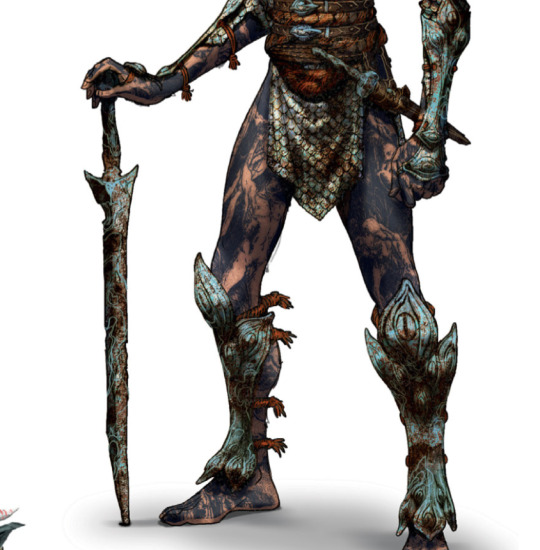
Finally, we see at the very right corner of the image an old woman with an apron that has a shape of an eye. This eye is the same one we find in the concept art of the Mythal's Temple guardians that did not make it into the game but we can see in the artbook of Inquisition. We can associate Mythal with a deep knowledge of the future that this eye may represent. We know Flemeth has been nudging history and [through the books], we can even suspect she has some foresee ability [read, for example, the meeting with Maric and Loghain in The Stolen Throne, several sections below].
The Eye may also be related to some presence in the dreams/Fade [let's remember that the Fade is a reflection of the Waking World, and you just need to "read and observe" the right way to have the information you need, according to Solas and several unreliable sources of Enchanters' codices]. In posts like Andrastian Design: Stained Glasses, the comic Until We Sleep or in Dragon Age Iconic Patterns: The Sun, I've talked about the impressive and yet easy to miss event of an elf in Val Royeaux who claims to have been visited by Mythal in dreams and after that conversation, he has his face burned with her vallaslin [Elven Servant Dreams of Mythal, another videos here]. The fact that Mythal can be related to the symbol of the eyes may show her relationship with foreseen powers and her ability to visit people in dreams and change reality through them. This is, so far we learnt in Feynriel quest [Feynriel - Somniari and Fade], the powers of the dreamers, and thanks to the comics Those Who Speak and Until We Sleep we know these powers also belonged to particularly powerful dragons.

In DA2, Flemeth's art can be found in the game itself in one of the Varric's narrations [Act 1]. In it, she looks like a mountain, with details of veins that make us suspect some relationship with titans and lyrium [design and visual detail discussed in Design of Kirkwall]. It's only in DAI where we learn through the codex and the mural “The Death of a Titan” that she was able to destroy a titan and, probably, took a unique power from it that may have encourage the Evanuris to kill her. It could also be the mere use of lyrium that the Evanuris started to implement in their magic to acquire more power and divine status. We can see in this image that the symbol of her staff is also in the background, cutting her in half: below the mountain, above the humanoid-dragon-like woman.

In this image, we see Flemeth wearing her war attire, which has a lot of parts that reminds us the statues of the Emerald Knights in Emerald Graves: Din'an Hanin or in the warrior version of Andraste herself. She is surrounded by dark smoke that reminds me the power that the elvhenan displayed in DAI: Abelas when he is killed by Morrigan, Flemeth when she is summoned as Mythal in her Altar, and Solas when consumes Flemeth's powers. In all these cases, they use dark smoke around them or in their powers. Read Somewhere in the Crossroads [Ending] to see the visual details of this. We see again the importance of the staff placed at the almost centre of the piece of art.

The "yellow mosaic" possesses a strong assumption: it has four shapes at the corners that may represent eluvians or something related to Mythal.
In the mural of “the Temple of Mythal” from “The actions of the Inquisitor”, we see that Solas draw a particular star of 8 points inside a door frame that resembles this “eluvian outline”, but it’s also the shape of the doors of the Temple of Mythal which represents Mythal herself in her dragon shape. All these symbols seem to reinforce the idea we explored in “The Death of a Titan”: Mythal seems to be related to the core power of a Titan represented by an asterisk that evolves into a golden ring and into a sun. However, it's curious to highlight that the sun was always a symbol related to Elgar'nan.
As I repeated several times in Speculations about the Vinyl Art, at times, we find some hints where stars or balls of fires [also understood as suns] are related to Mythal and Elgar’nan, making us suspect that, maybe, Mythal and Elgar’nan share a nature similar to Falon’Din and Dirthamen’s: apparently, the same creature with two different aspects from them. If this were the case, associating Mythal with the Sun would make sense, and it would also explain why, if Elgar’nan was so central in the Elvhenan culture, there are so few representations and statues of him, while Mythal overwhelms it.
The center of the mosaic displays the Asterisk Symbol [made of 8 points], which may be related to the core of a Titan [asterisk of 8 points too]. The link is immediate when we see that this asterisk is outlined by a shape that looks like a star or a Sun, inside a big ball with triangular-shape ends. This same symbol appears in the Trailer of DA4, behind Solas, when he is presented like an Hermit, mysterious, apostate mage. Around this “sun” we can make out several concentric lines that may refer to a “Golden Ring”.
The Asterik symbol also appears in murals such as “The Creation of the Veil” or “The Death of a Titan”, which allowed us to relate them with the core of a Titan and its immense power of “making real what you imagine by reinforcing the reality”, but this symbol also appears in a corner of Solas’ tarot card. For more details, read Dragon Age Iconic Patterns: The Sun .

Her art in Heroes of Dragon Age shows her more like a chasind mage, with a painted fave [1,2], and a curious staff of an appostate [1,4], which is also depicted, sometimes, in Solas' art. This staff made it into the game, and was reused many times in DA2 making it a bit meaningless. We can clearly see the similar design in her dress as a chasind mage [1,2] as well as in Flemeth's war attire [3]. In [3] we see again the staff that looks like an eye.

The vynil: I made a whole post about the potenciality of understanding the dragon we see in the Vynil as (a fragment of) Myhtal. Since it's a strong hypothesis, I will leave it there, so you can read more about it in Speculations about the Vinyl Art.
Flemeth in the books (or comics)
The Stolen Throne
In this book, we see Flemeth when Maric Theirin and Loghain are captured by Dalish that delivered them to her. As an exchange to leading them out of the Wilds, Flemeth requests Maric to make a promise we don't know about it, as well as giving him the knowledge that a Blight will occur in Ferelden. She also gives him a cryptic warning about Loghain: "Keep him close and he will betray you, each time worse than the last." These details reinforce the idea that she has foreseeing powers that were implied in the art through the symbol of the eye.
Flemeth is presented as a decrepit woman: " She was the very picture of a witch, wild white hair and a robe formed mostly of thick black furs and dark leather. Hanging down her back was a heavy cloak trimmed in fox fur, quite striking and delicately stitched. She carried a basket filled with large acorns and other items wrapped in red cloth".
She also uses sylvans. At some point, Loghan is attacked by a sylvan, what forces Maric to beg forgiveness to Flemeth. She is surprised, and once again, we see that she really appreciates "good manners":
Sweat trickling down his brow, Maric cleared his throat and carefully lowered himself to one knee. “I beg your pardon on behalf of my companion, good lady.” His voice was quiet, but the old woman appeared to be listening, fascinated. “We have been running for days now, and after the Dalish attacked us . . . we expected more of the same, despite the fact that you have offered no provocation. I apologize.” He bowed his head, trying his best to remember the courtly manners so painstakingly taught to him over the years by his mother. To think he had rolled his eyes at those lessons, assuming that he would never have an actual use for them. The witch laughed shrilly. “Manners? My, but that is unexpected.���
We also can see again Flemeth's foresee abilities:
“So you are he,” the witch said, nodding with approval as she studied Maric. “I knew you would come, and the manner in which you would come, but not the when.” She let out a sharp guffaw and slapped her knees. “Isn’t it marvelous how very capricious magic can be with its information? It’s like asking a cat for directions—consider yourself lucky if it only tells you where to go!” She howled with laughter at her own joke.
This also makes sense with the image of the temple of Mythal and its guardians in the concept art, with eyeball tattoos or armour. We can assume this comes from her ability to present herself in the dreams of some people, as it happened with the elven man in Orlais. This symbol of eyes, also presented in the first art piece of the section of Flemeth Art, can be considered a way to represent her omnipresence due to her ability to visit everyone in dreams, or foreseen powers.
“Fortunes change.” The witch’s gaze shifted to far off in the distance. “One minute you’re in love, so much in love that you can’t imagine anything wrong ever happening. And the next you’re betrayed. Your love has been ripped from you like your own leg, and you swear you’d do anything—anything—to make those responsible pay.” Her eyes focused on Maric, and her voice became soft, caressing. “Sometimes vengeance changes the world. What will yours do, young man?”
This part seems to reinforce the concept that Flemeth and Mythal are allied in order to perform a revenge. Through the tales of Conobar and Osen, we know that Flemeth may have been avenged thanks to the help of Mythal, and now it's the turn of Mythal: for which Flemeth has been changing and modifying the events of the world in order to accomplish this so long-awaited reckoning.
Loghain stepped forward angrily. “Leave him alone.” The witch turned to regard him, her eyes delighted. “And what of yours? You’ve rage enough inside you, tempered into a blade of fine steel. Into whose heart will you plunge that one day, I wonder?” “Maric and I are not friends,” he growled, “but I don’t want him dead.” Her chuckle was mirthless. “Oh, you know what I speak of.” Loghain paled, but regained his composure almost immediately. “That . . . doesn’t matter any longer,” he stated evenly. “Doesn’t it? Have you forgiven them already, then? You no longer remember her cries as they held her down? The laughter of the soldiers as they held you back and made you watch? Your father when he—” “Stop!” Loghain shouted, his voice filled with as much terror as fury. Maric watched in shock as Loghain launched toward the witch as if to strangle her. He lurched to a halt before he reached her, hands clenched tightly into fists as he struggled against his impulse. The trees around the hut seemed to creak in anticipation, like coiled springs. The witch merely rocked and watched him quietly, unconcerned. “You see too much, old woman,” he muttered. “In fact,” her tone was dry, “I see just barely enough.”
We can see here Flemeth's powers: she sees Loghain and can see when he had to watch Orlesians rape and kill his mother in front of him, who was a mere powerless child at the time. She sees into a person and sees the most traumatic events in their past. And probably this is why she can see the future as well. Hence, another reason more why her original concept implied an eyeball.
Loghain also didn’t want to think about what sort of promise the witch had elicited from Maric. He had gone into her hut and had remained there for hours, long enough that Loghain grew concerned. He had been trying to peer in through its one filthy, grit-covered window when Maric walked out the door, alone. The man seemed shaken and quiet and was resistant to even the most casual efforts Loghain made to inquire about what had gone on. So it was to remain a secret, after all.
Later we can suspect that Maric was in shock because Flemeth told him the destiny he had to fulfil in the next book: The Calling.
The hut was empty of everything but dust and rot, as if nobody had lived there for years. They searched about, but there was no sign of the witch. There was also, he noticed, no sign of Dannon’s body or his makeshift grave. It seemed they were free to go. It took them four days’ travel to leave the Wilds. Supposedly, the witch had told Maric they would see the way out once they left her hut, and sure enough, not an hour away a bluebird appeared in the trees before them. It was so out of place, and sang so sweetly, that both Loghain and Maric took instant notice. As they approached, it flitted to the next tree and to the next until Loghain realized it was leading them. So they followed. When it reappeared the next morning, there could be no doubt. The only thing Maric didn’t talk about was the witch.
Loghain and Maric are guided out of the Wild, showing the powers that Flemeth had in the Kocari Wilds.
[As they returned to Ferelden and out of the Wilds] It wasn’t long after leaving the ruins that they encountered wolves again. For the first time, Loghain was truly beginning to believe that the old witch had called on greater magic to aid them than just summoning a bluebird guide. Loghain stood with his bow at the ready, eyeing the wolves warily, while Maric remained breathless beside him. The entire pack, however, maintained its distance and watched, but did not threaten. Loghain and Maric moved cautiously through the trees, with perhaps twenty large wolves sitting and staring at them silently with their feral yellow eyes. Still, nothing happened. As soon as they were out of sight, Loghain let out a long breath. He swore that he never wanted to encounter magic again as long as he lived, and Maric murmured agreement. [...] When the sun went down that day, the bluebird vanished.
Interestly enough, Flemeth also uses the help of wolves to guide Maric and Loghain out of the Wild. The curious detail I liked to highlight is that they all share the yellow eyes, a feature that has been very unique of certain characters: Flemeth and her daughters [Morrigan and Yavanna], Abelas, some Qunari [we can notice this in more detail in the comics], and Titus [a Magister who performed dragon blood drink rituals]. All of them related to Mythal and/or dragons. However, in DAI, the feral wolves always appeared with Fade-like coloured eyes.
Dragon Age: The Calling
Fourteen years later, Flemeth's words inspire Maric, now King of Ferelden, to accompany the Grey Wardens on their expedition into the Deep Roads. He later relays her words to Loghain, who disagrees with them and points out that she may have been deceiving them.
Maric steepled his hands together and considered. He hadn’t wanted to tell Loghain, but it seemed like he had no other choice. “Do you remember the witch we met in the Korcari Wilds?” he began. “Back during the rebellion, when we were fleeing the Orlesians?” Loghain appeared taken aback, as if he hadn’t expected a rational explanation. He hesitated only a moment. “Yes. The madwoman who nearly killed us both. What of her?” “She told me something.” Loghain looked at him expectantly. “And? She babbled many things, Maric.” “She told me that a Blight was coming to Ferelden.” He nodded slowly. “I see. Did she say when?” “Only that I wouldn’t live to see it.” Loghain rolled his eyes and walked a step away, running a hand through his black hair. It was a gesture of exasperation with which Maric was well familiar. “That is a prediction that almost anyone could safely make. She was trying to scare you, no doubt.” “She succeeded.” He turned and glared at Maric scornfully. “Did she not also tell you I was not to be trusted? Do you believe that now, too?” There was a tension in that look, and Maric knew why. The witch had said of Loghain, “Keep him close, and he will betray you. Each time worse than the last.” It was the only one of her pronouncements to which Loghain had been privy, and obviously he remembered it well. Perhaps he thought that if Maric believed one, he believed the other. Loghain had never betrayed him, not to his knowledge. It was something to keep in mind. “You think it’s a coincidence?” Maric asked, suddenly uncertain. “I believe this witch was serving her own purposes, and would lie about whatever she thought convenient. Magic is not to be trusted, Maric.” Loghain closed his eyes and then sighed. He shook his head slightly, as if what he was about to say was madness, but he opened his eyes anyhow and spoke with conviction. “But if you truly believe that the witch’s warning has merit, let me be the one to go into the Deep Roads, not you. Cailan needs his father.” “Cailan needs his mother.” His voice sounded hollow, even to himself. “And he needs a father who isn’t . . . I’m not doing him any good, Loghain. I’m not doing anyone any good here. It will be better if I’m out there, helping the kingdom.” “You are an idiot.” “What you need to do,” Maric ignored him, “is to stay. Look after Cailan. If something happens to me, you’ll need to be his regent and keep the kingdom together.” Loghain shook his head in frustration. “I can’t do that. Even if I believed this cryptic warning, I would not agree that it was worth placing you in the hands of these Orlesians. Not without an entire army to surround you.” Maric sighed and sat back in the throne. He knew that tone. When Loghain believed he was in the right, there was no dissuading him. He would sooner call the guards in here and attempt to have Maric locked up in the dungeon than see him do this. In Loghain’s mind, the Grey Wardens were Orlesian. The First Enchanter was Orlesian. This had to be some manner of plot—not that it would be the first. There had been several assassins over the years, as well as more than a few attempts by disaffected banns to overthrow him, and while Loghain could never prove that the Empire was behind them all, Maric did not disbelieve his theories. Perhaps he was even right about this. But what if he wasn’t? The witch had been crazy, almost certainly, but Maric still found it impossible to discount her words entirely. She had saved their lives, put them on the path out of the Korcari Wilds when otherwise they would have died. He had almost forgotten her warning about the Blight, but the very instant First Enchanter Remille had told him of the Wardens’ request for an audience, he had remembered. The thought of a Blight here in Ferelden was almost too much to bear. [...] Surely such a disaster was worth risking almost anything to avert. Loghain could dismiss the idea, but Maric was less convinced. What if the witch was correct? What if the whole point of receiving such a prophecy was that it gave you a chance to try to prevent it?
Here we have the mystery explained: Maric was told about the incoming Blight and that he would be dead by that time.
[...] “And here I thought it was the Commander’s charm,” Duncan quipped. Maric ignored him. “After my mother died, Loghain and I were lost in the Korcari Wilds trying to get away from the Orlesians,” he began, his voice solemn. “We met an old woman, a witch who saved us. She gave me a warning. She told me that a Blight was coming to Ferelden.” There was something more to his story, Fiona could see it. But he stopped there, snapping his mouth shut. Genevieve pondered the tale, and looked at Maric curiously. “A witch hiding in the Wilds? And you believe what she said?” “There were . . . other things she said that were true.” “Magic cannot see the future, Maric,” Fiona told him. “But there are visions. Mages can see them; you said so yourself.” He let out a long, ragged breath. “I don’t know if I trust her. I paid a high price for the witch’s words, however, and it just seems like too much of a coincidence if it isn’t true.” Fiona saw the shadow behind the man’s eyes. She didn’t know the full story of this witch, but she could see that its implications disturbed him. And he believed in what he had been told. But that was not so incredible, was it? Fiona believed in Genevieve’s vision. They all did. It was not difficult to believe that at the root of these visions lay the Blight, warnings against the coming disaster.
We learn that Maric was disturbed by the warning of the Blight, but also that he had paid a high price to be saved and informed of these things. The only thing I believe he was locked in a promise is what Yavanna says in the comic: He had to awake greater dragons that were sleeping, but somehow, he failed to his promise due to the kidnapping under Titus. Read the details in The Silent Grove .
Dragon Age: The Silent Grove
Flemeth is mentioned by another daughter, Yavanna, the Witch of the Wilds in the Tellari Swamps of Antiva, who reveals that Flemeth made Maric promise to come to the Silent Grove once his children were grown. She also says that Flemeth's ritual of possession that Morrigan feared is, in fact, a "gift."
Yavanna: I had no idea you had met my sister Alitair: Then you'll be shocked to hear how I encountered your mother. Flemeth likes sunsets, turning into things, and talking about how clever she is. I'm also told she possess her daughters. Y: Is that right? Ha! Alistair: What's so funny? Morrigan found out what Flemeth planned and we stopped it Y: That poor, confused child. It is a gift.
This coincide with the notes that Gaider shared few time ago about the planning of the scene of Flemeth's death or with the dev's notes inside the game [read Somewhere in the Crossroads [Ending]].
Conclusions
If we gather all the bits of information along the games, we have a more complete picture of Flemeth, her relationship with Mythal, and some degree of enlightenment about her goals:
She polymorphs into a Dragon [DAO], but we have a good amount of reasons to suspect she is a dragon, and probably one of the Greater Dragons that only are mentioned in the comics [The Silent Grove]. Since we find in Elvhenan ruins her mosaic as a mother of many [see Evanuris] but also as a dragon in the shape of a gate, we can suspect a double nature in her: Dragon and Evanuris/elvhen. This duality is one of the main reasons why we could suspect that the Evanuris who was Forgotten One and Creator [according the unreliable Dalish Legends] was her instead of Fen'Harel [since Solas told us he never was a god, and he has always been this elvhen we see, read Solas sharing Lore: Part 1 - Part 2 for refreshment]
She has a set of beliefs that justify and make her behaviour more understandable:
She believes that we have to doubt all what we know, which makes sense since the repeated theme in DA series is how unreliable history and stories are due to the nature of the political, social, and religious conditions in which they develop. She also reinforces a level of disinterest in trying to push the "truth" onto others. She is so tired and worn-out, and understands the "nature of humans" too deeply, that she knows that they will believe only in what they want to believe. It doesn't matter the truth, hence she does not put energy in sharing it, not even in those who are willingly to stay open minded for it ["They do not want the truth"]. When it comes to the truth, she claims it's not the end, but the beginning.
For her, names are useless. She is known across history by many names, and gives them no importance. This detail may say a lot: elvhenan put their goal and purpose in life in their own name; if she keeps part of this tradition in her Mythal mind, having no name is almost an equivalent of not having purpose.
Bodies are useless too: Mythal can take different bodies and be in different places at the same time. Flemeth has put a fragment of her in an amulet that allowed her to be raised in DA2 after potentially being killed in DAO. When you talk to her, you are informed that bodies are things that annoy her. This makes sense when we think in the shapeless culture that the Elvhenan had long time ago. Flemeth is a piece of a bigger thing, a bit lost and wandering in Thedas, a shadow that dies slowly under the sun, but also a flotsam to cling to in a chaotic storm. All images of someone broken, diminished, tarnished, agonizing, that still tries to survive because has one thing to accomplish: a destiny to fulfil. This terrible change in her was product of “things that happened that were never meant to happen" .
Flemeth has a clear goal and purpose, deeply related to the Revenge of Mythal. For that reason, she has been meddling in the History in order to orchestrate a big plan, which we, as players, have no idea about.
Betrayal and Revenge: Flemeth has this concept deeply attached to her persona. It's not only the Betrayal of Mythal by those "who attacked her Temple" and assassinate her, it's also Flemeth and a Betrayal from one of the men she was involved with, according to the unreliable tale of Conobar and Osen. If Mythal changed after the assasination, and her motherhood and Justice purpose were twisted and changed into Revenge, we may have conflicting lore about Elgar'nan and her [both with the same purpose of revenge]. This point is never clear with the games up to DAI.
However, via the Altar scene, we know she used to be called for revenge, even before the assasination, so Myhtal always had this aspect related to her.
"She was betrayed as I was betrayed - as the world was betrayed! " This line, so iconic, and in combination with all the proofs gathered in these posts, makes us suspect that the Betrayal of Myhtal is her assassination [at the hands of those that attacked her Temple, according to Abelas' words]. The Betrayal of Flemeth is also unknown, but we know it is related to a mixture of the several versions of her story with Conobar and Osen. But the betrayal of the world could mean the creation of the Blight that required brutal measures to be contained: hence the creation of the Veil and the destruction of the Elvhenan empire with it.
Flemeth remembers promises: According to Marethari, Flemeth always keeps her word, and has a good memory about those who made a pact and a promise with her. This is confirmed when Flemeth is surprised that Hawke kept their word.
Mythal, the elvhenan goddess: We know that Mythal is the embodiment of motherhood thanks to the unreliable Dalish legends, but also thanks to the only mosaic that shows her as an elvhenan [see Evanuris]. In this mosaic, she is depicted with a flaccid breast and five small creatures in her arms, as a symbol of breastfeeding babies. This version appears in the Temple of Mythal [Part 3], in the Emerald Graves: Din'an Hanin, and in the last platform where we fight Corypheus in DAI [Frostback Mountains: Somewhere North, although it's focused only on her elvhenan face]. However, there is another depicture of her: the dragon one, usually present in her Temple where she imparted Justice.
Motherhood and Justice: We know that Mythal represented these two concepts, and they were kept in the unreliable legends of the Dalish, as well as her "terrible" side, related to a certain degree of Wrath. The Dalish seem to justify this side as the "angry mother" side, but as we explore the games and focus on Flemeth, we discover that she always had a Revenge representation. Solas even confirms it in the Altar scene. This Revenge may be an interpretation of Justice, so it would still make sense. But it all depends on the degree of rationality that this revenge has in itself. Otherwise, it would have been crossing the same paths that Elgar'nan [if we can trust the representation that we have of him, since most of it comes from unreliable Dalish sources and elvhenan ones]. However, we always need to keep in mind Solas' words: Mythal was always a complex creature [hence more reasons to suspect her duality as Elvhenan/Evanuris and Forgotten One]
Blight and Grey Wardens: She seems to be aware of all the rituals and treaties related to the Grey Wardens. She also has enough power to always keep the darkspwan away, even when she lives in the place where the main outbreak happened [Kocari Wilds]. This is also implicity seen in Solas`case, in the comic The Missing; thanks to these powers that he absorved from Flemeth, he can hide in the Deep Roads overwhelmed by darkspawn while keeping himself safe from Venatori and other human dangers. This makes us suspect that Flemeth and/or Myhtal have a certain degree of command over the Blight. That Solas and Flemeth have a deep knowledge of the Blight and the Joining ritual of the Wardens is not surprising if we rememeber that these things may have come from the knowledge of ancient Arlathan elves [read Tarohne, the Fell Grimoire, and Xebenkeck for details]. Like Solas, she explicitly says that there is a bigger Evil behind the Blight, and it's what humanity should be worried about, not so much about the darkspwans [DAO].
Magic and powers that once were: Flemeth taught Morrigan a great deal of ancient magic related to forbidden rituals [DAO ending] or blood ancient magic. She encouraged in her daughters to preserve the powers of the Old at all cost [Morrigan] as well as give them the position of guardians of Dragons [Yavanna]. This makes us suspect that a lot of the ancient magic that Flemeth was always interested on preserving is related to ancient Dragons. Maybe this is a potential hint about the Forgotten Ones and the hypothesis that they may have been ancient powerful dragons that ruled the skies once [this was informed by Yavanna in The Silent Grove]
Foreseen powers: She seems to have a certain degree of foreseen powers, letting her know that Maric and Loghain will visit her in the Wilds, that our Warden in DAO was key in the survival of Ferelden, and that Hawke was useful for her due to a potential death at the hands of the Warden. Related to these powers comes the well known line "It's fate or chance? I can never decide". She also foresees a radical, inevitable change of the configuration of the world: "We stand upon the precipice of change. The world fears the inevitable plummet into the abyss." These powers don’t seem to be triggered at will; it seems she sees it in the moment she interacts with the person. She sees Loghain’s betrayal in the moment she sees him directly, as well as she sees Hawke’s usefulness in the moment she speaks to them face-to-face.
Via small hints in the concept art, we can relate Mythal with eyes that may represent her foreseeing abilites as well as her power of changing reality throuh dreams, giving us a clue that she is a dreamer, powers that we know via the comics Those Who Speak and Until We Sleep were part of the original powerful dragons that ruled the sky in the begining of the times.
Music: Flemeth talks about songs and music as a metaphor of the concept of "manipulation". Morrigan's song is the manipulation of the Warden to kill Flemeth. At other times, the concept of music is merely a metaphor of facts: Flemeth also is "dancing the same song", related to be killed by those who she helped or had some dedree of her trust [this may be a reflection of Mythal's story as well as Flemeth's with Conobar and Osen].
Dalish as the young, bright, and vibrant People: Flemeth, unlike any other elvhenan we saw in the series, has respect for the Dalish. She always claims they are vibrant and young, and they do not need to bend the knee before her [Merril] unless they truly know who she is [Elven Inquisitor].
We also know via Solas that the Evanuris are hard to kill [reason why he trapped them instead of killing them long ago], so we can assume the same characteristic applies to Mythal. If Mythal was “killed”, we can assume that whatever it happened had a big power considering how hard is to kill an evanuris, and even more so a powerful one as Mythal. Maybe this is the reason why she changed so much: death itself or the event that killed her changed her radically because it was too traumatic and extraordinary.
Worshipping of Mythal: Via Abelas, we know that Mythal does not like slaves; serving her has to be an act of volition; the person has to work on in order to acquire the "right to serve her". However, she abandoned her followers after the assassination. It seems that she changed so much that she could not or do not want to answer the prayers of her people [Abelas] nor the Dalish ones [Elven Inquisitor]. Even though it is not explicit, it seems to imply that answering those prayers would have been disastrous because she stopped being the Mythal they believe in, and now she is the embodiment of a terrible thing [maybe Vengeance itself? Maybe corruption? Hard to say]. If it's because she is now too related to Vengenace, it would bring some conflict to the lore and the representation of Elgar'nan. However, we were already warned that Mythal took Elgar'nan's place long time ago to pass judgement upon The People [The judgement of Mythal].
Mythal can use and activate eluvians to walk into the Fade, and this is a testament of her immense power. Apparently, Mythal and Flemeth are the strongest when they are in the Fade, or at least, in that part of the Fade when we meet her with Kieran [DAI]. This could be because the evanuris-elvhenan nature of Mythal, as a creature of the Fade, but it could also be due to her dragon nature. If we remember the comic Until We Sleep, we find out that dragons and their blood had a particular power in the Fade, they are basically Somniari or Dreamers, able to modify the Fade and turn it into reality.
Regrets: Flemeth claims she is so filled with regrets that they poisoned her [DA2]. Unfortunately, there is no more information about this aspect of her in other scenes.
Possession process: Flemeth describes her relationship with Mythal in a similar way that Anders does with Justice: they are one, hard to separate one from the other. We can suspect that the tale of Flemeth using her daughter’s bodies to extend her life may be a lie. Yavanna seems to laugh at that idea, as well as Flemeth does, but following her philosophy of “let them believe whatever they want”, she doesn’t clarify the idea. The strange thing in this piece of lore is that we don’t see this process in Kieran, who has a similar condition, in principle: an ancient being was hosted in his body. In his case, Flemeth is able to remove it without hurting the boy. The only other case we see in lore about de-posessing a person without harm is with the Avvar: the spirit is willing to leave the host without scarring them. Maybe this is what happens with Kieran, and thus his following commet after the process: he feels alone, like in the case of Sigrid Gulsdotten [read Stone-Bear Hold Avvars - Part 1]
Urthemiel piece: it seems that Flemeth has some level of command over Urthemiel to the point to ask him to reach for her in the Fade via the Eluvian. Both of them have a destiny to fulfil, whatever that is. We may suspect it is related to the revenge/justice of Mythal.
The Well of Sorrows is a device made of the will of all the high priests of Mythal. Despite being shown in the game as a reliable source of information, I would consider to treat it carefully since we are told it can be manipulated by Mythal herself.
25 notes
·
View notes
Text
I just realized that Gilear is the only competent parent in that household. Aside from Cathilda, who for sure raised Fabian more than his own mother did. But in terms of "default" parental figures, Gilear is the only one who is going to fully show up and be ready.
Telemaine has an entire world to learn about; you put that baby in granpapa's arms and tell him you just need an hour, you're getting a call from the cops telling you they found your baby with a strange man buying lotto tickets at a 7/11.
Hallariel is in no shape or form fit to raise another child. And I can see a world where we get some long overdue development in her character and relationship with Fabian, where she comes to understand what a shit mother she's been, but she's gonna fumble the bag a lot until then.
And you know Cathilda is gonna be doing a lot of the pushing in that department. It'll worry her to let go of the reigns on such a young child, but the satisfaction at seeing Hallariel's face when she goes to pawn off the baby and Cathilda refuses will be more than enough to reassure her that this has to happen.
So that just leaves... Gilear. A fully capable parent who already raised one kid, and who is still a prominent figure in that child's life. It's Gilear in the midst of caring for a newborn whilst Telemaine has Alston declaring his own nemesis, Hallariel panics on the sudden lack of Cathilda, and Fabian furthers his elaborate scheme to kill this baby as he stubbornly fights the slow creepings of affection.
Godspeed, Gilear o7.
#dimension 20#d20#fantasy high#fh#fantasy high junior year#fhjy spoilers#fhjy#fantasy high senior year#fhjy speculation#gilear faeth#hallariel seacaster#telemaine lomenelda#fabian seacaster#cathilda the black
2K notes
·
View notes
Text






haha guess who got too into turning an infodump into a comic ... meeee. this took twelve hours lol
aaanyway, i think i might turn this into a series! different characters explain lore and worldbuilding stuff to you! what would you like explained next? :D
#transformers: high frequency#tf hf#transformers ratchet#ratchet#cliffjumper#bumblebee#arcee#prowl#elita one#megatron#optimus prime#fan continuity#fancontinuity#redesign#re design#tf au#speculative biology#headcanons#headcannons#maccadams#anatomy#cybertronian biology#yoanne#kai#mari#oc#original characters
613 notes
·
View notes
Text
it doesn’t seem like the ratgrinders are very good friends. none of them were there to support ruben during the show and it doesn’t seem like they hang out at school. especially considering how much part the bad kids have in kristen’s campaign in comparison to the ratgrinders in kipperlilly’s. i think they’re just a bunch of powerful kids who got stuck together and are making the most of it but probably hate each other. that’s my theory at least.
#i can’t imagine them being friends#the ratgrinders#ratgrinders#dimension 20#fantasy high#fantasy high junior year#fhjy#fhjy spoilers#fhjy speculation#d20
2K notes
·
View notes
Text
buddy dawn being the only cleric to accept corrupted ankarna is such a telling thing. we know helio's worship can already veer into rage and conquest so he was already primed to accept it all as necessary.
but also helio just let him die. buddy was so sure that "helio wouldn't have let that happen" and then helio did. and maybe buddy met him in heaven, saw that he's just a frat bro.
and then ankarna is offering him a chance to come back. take a step to the left and worship and different but similar god. his faith is shattered already. it was too easy for him to say yes. he's a kid, after all.
#dimension 20#d20#d20 fantasy high#fantasy high junior year#buddy dawn#fantasy high#fhjy spoilers#fhjy speculation#fhjy#d20 fhjy
728 notes
·
View notes
Text
Oh my gosh Beardsley that was SO SMART to figure out the people whose blood crystallizes are the people who TURN DOWN being brought back to worship Ankarna god DAMN
#that’s so interesting that buddy agreed to that so quickly#like the man was FULL helio#then got murdered and was like FUCK THAT I’mma rep this nameless rage god#do you think he knew that was gonna happen#I’m gonna say no and he was so mad at Kipperlilly for murdering him that he agreed#which is maybe what she wanted to happen although as a long term plan that seems… poor to say the least#ankarna#d20 ankarna#buddy dawn#kipperlilly copperkettle#kipperlilly clerickiller#dimension 20#d20#fantasy high#fantasy high junior year#fhjy#fhjy spoilers#fhjy speculation#fantasy high spoilers#fantasy high speculation#fhjy ep 16#untapped rage#untapped rage spoilers#live reaction#ally beardsley#kristen applebees#lotta SMART MOVES from Kristen applesbees in the last two Les
527 notes
·
View notes
Text
Alright. So this episode was great, but in terms of themes & setting the stage for the rest of the story, this line really stands out:
"You feel something. You look, the Night Yorb twinkling. You've spent your whole summer chasing this. You know all the things you've missed. Your whole summer vacation, all of your friends. Some of you had birthdays on the road this adventure, and yeah, there's lots of adventure, but all of you feel a tiredness in your bones knowing that the reward for saving the world yet again will be going back to school and having another year of working just this hard forever."
This monologue from Brennan is the most thematically/foreshadowy thing we get in the episode, and it does set quite the stage. This is a story about exhaustion and the price of adventure. It's a story about what the hells these six people are going to do with the rest of their lives.
Fig releases something at the end of the episode. Some piece of magic that will certainly mean something later. This is how it's described:
"You've been holding onto a piece of magic for a long time... If you take me, you know what you would save. And you smell something sour and curdled."
"There is a flash of light, a kind of lemony yellow creamy light that flashes out over the hangvan."
Pay attention to that word choice. The magic is "sour" and "curdled" and "lemony yellow creamy." Is it reminiscent of anything?
Gilear's connection with yogurt is established pretty early on in Fantasy High, and yogurt in general serves as a symbol for everything that Gilear is. A sad, pathetic adult and A Normal Guy. Brennan is very insistent when reading out Gilear's stats for the first time that he's just a guy! Some people have to be normal!
But our Bad Kids aren't normal. That's the whole point of them. They've saved the world. Falling to Gilear's level is terrifying. It's literally Fabian's nightmare.
From that part of Pirate Brawl:
"You hear a voice behind you" [Gilear!Fabian] "say: 'It's all going to be all right... I know it seems very far off, but there is a way for you to be happy.'"
And of course, the yogurt, the symbol of mediocrity, is here too. "The yogurt curdles in your stomach." Curdles. The same word used to describe the magic coming out of Fig. The yogurt that Fig gives to Fabian while he's having his breakdown in Leviathan is lemon flavored too.
Of course the primary conflict seen in the trailer is about difficulty graduating. That's a normal problem. That's a normal concern for normal people.
The fear of mediocrity can be strong. Especially for people as exceptional as the Bad Kids. But the fear that you'd be happier taking the easier path, that the road less traveled isn't inherently better, that your hardship is for nothing... that's even worse.
The reasonable thing for Fig to be releasing would be the red growth seen on the minis in the trailer. But no. She releases something lemony and creamy and sour and curdled.
#fantasy high#fantasy high junior year#fhjy#fhjy spoilers#d20#dimension 20#figueroth faeth#no i cant tell if im joking here either#meta#speculation
1K notes
·
View notes
Text

physeng(write, file, "tco_physeng_breakdown.png");
to:compiler {file}

to:compiler {txt: "Internet and Outernet are full of StickFigures with similar body plans, so there are optimizations for rendering vector strokes specifically. it's way more efficient to use those optimizations than keep calculating perfect spheres for no aesthetic benefit."}
{txt: "btw why haven't heat issues been patched yet"}
{txt: "i fixed this years ago for the latest model. remember."}
from:compiler {txt: "Thank you. The avast! nodes will appreciate the credits. TheChosenOne.exe has been unreachable for some time."}

to:compiler {txt: "you mean OuternetPhysEng still won't update their programs"}
from:compiler {txt: "Yes."}
to:compiler {txt: "and still won't provide a specific location?"}
from:compiler {txt: "Do not allow them to bring up the moral argument again."}
to:compiler {txt: "OK. fine. yes. i will spare both of us"}



to:compiler {txt: "abridged or full docs?"}
from:compiler {txt: "Abridged. Please describe the acronyms."}
to:compiler {txt: "ofc"}

{txt: "
sel.per.filter: standard StickFigure component (src)*****. invisible membrane with special collision properties. protects mouthparts.
H2O scoop: avast! code. implements water retrieval from ambient air.
EIS: avast! code. destroys ingested materials identified as, "dangerous" before they reach internal systems.
SOS: avast! code. they only said this one was, "used for control."
ECL: avast! code. recycles some forms of contact energy.
THROUGHLINE: base code, initialization data, and processing space for vitals. found in some form in all StickFigure-type worms. following unique sectors noted: Black Hole Monitoring System, Basic Intake Threat Enum, Fly By Wire.
smaller points list other vital and peripheral systems.
"}
from:compiler {txt: "Thank you. That's enough."}
end(physeng());
@compressedrage as per my previous email /silly
related: pliable stick figure biotech
#part silly part serious effort part headcanon lore dump part speculation part diegetic technical document-#the most complex diagram i ever-#anD the entire interconnected system of hcs ive had on TCO functionality to date.#pleeeeeeease ask me about it :33333 if u wanna#of course chosen would have no clue about Any of these specifics. that's like expecting a preschooler to know the Krebs Cycle.#meaning no insult to their intelligence - just that there's no way for them to know unless someone tells em ¯\_(ツ)_/¯#and there's no junior high Health class for elusive hi-PWR sticks. seems like these two are big fans though(?)#;3#***** ''filter is a two-way selectively permeable membrane that allows some objects through and rejects others ...#... can: filter gases from liquids ... cannot: filter microparticles (smoke [or] aerosols)''#--/ art#--/ story#alan becker#ava the chosen one#animator vs animation#subpixels#executable!au#ava au
260 notes
·
View notes
Text
Honestly my second favourite theory about buck's spiraling in 8x06 is that Tommy admits he initially tried to date Eddie, and Buck kind of spirals over being second choice, and he ends up at Dispatch and tells Maddie something along the lines of 'and I get it, I know Eddie's great' blah blah blah and maybe Maddie draws attention to that line somewhat and we see the moment it clicks in Buck's head. And of course, Eddie's allegedly straight and cue the pining. To me it would be really neat and potentially full of parallels to 7x04&5, the beginning of the relationship, where Eddie already was little miss haunting the narrative. It just makes sense in my head for buck and tommy to end because of eddie, when they got together because of him, too.
My favourite theory of course, is that Tommy is Abby's ex Tommy.
#will any of this happen? no. but a girl can dream#if it did happen i would go insane fyi#911#911 on abc#911 speculation#evan buckley#eddie diaz#buddie#anti bucktommy#<- not really but i *am* theorising about a break up so#crow rambles while high on sleep deprivation#911 abc
150 notes
·
View notes
Text
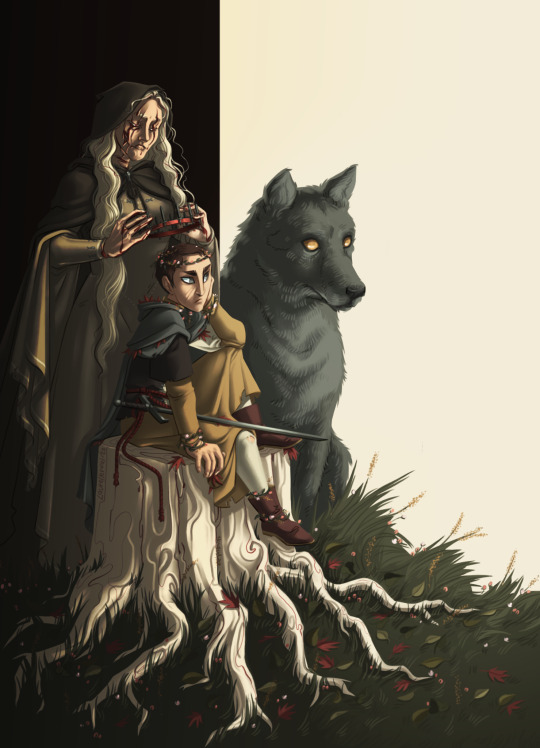
Lady Stoneheart, Nymeria and Arya
#asoiaf#asoiaf fanart#arya stark#house stark#lady stoneheart#catelyn stark#nymeria#twow speculations#riverlands#high heart#robb's crown#trying something different with the lineart#hope you like it
2K notes
·
View notes
Text
Dragon Age Iconic Patterns: The Sun

In this post I will try to extensively gather all the sun-based or sun-like imagery that we find in all the games of Dragon Age. From the most typical ones to those which may seem obscure or with a hidden allegory/design. I will qualify their resemblance with the Sun symbol as Strong, Weak or other.
This post contains the following symbols
Chantry Sunburst
Elvhenan Culture: Sun symbol among the Evanuris
Elvhenan Culture: Asterisk Symbol and Elvhenan Doors
Elvhenan Culture: Golden Ring
Elvhenan Culture: Crappy Sun
Elvhenan Culture: Elgar’nan and Sylaise
Elvhenan Culture: Murals
Tevinter Culture: Green Star
Tevinter Culture: different decorative elements
Dwarven Culture: Fairel and Dwarven art
Ferelden Culture: The Sun Face and the geometrical Sun
Grey Wardens and the Sun
Avvar and the Sun
Flemeth
Qunari, Par Vollen, and the Solium Constellation
DAO design
Free Marches Rural Areas
[This post belongs to the series “Analysis and speculation of Statues”]
[Strong] Chantry Sunburst
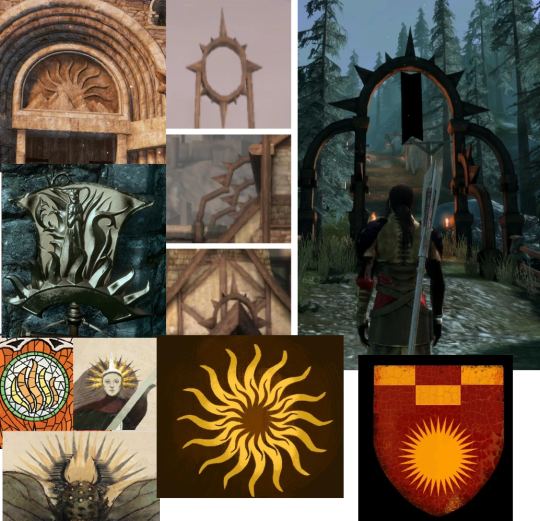
The most typical one that appears in DA series is the Sun or Sunburst with wavy rays, repeated so much along the games that we can identify it immediately. It’s the unequivocally symbol of the Chantry. We found it in many versions, and it represents the “dawn” with the idea of hope and “new beginnings”, but also the fire that “purified” Andraste in her pyre to let her ascend to the Maker’s side. In the posts of Andrastian Art [Andrastian Design: Stained Glasses], we also find that “balls of fire” [which can be interpreted as a Sun in another way] are shown to represent the Maker or the Faith in Him.
Andraste’s single spiked helm seems to be inspired in a single sun ray, at least this is what an illustration in the Chant of Light [book of World Of Thedas] seems to suggest.
In general, most of the representations of the Chantry Sun have 16 rays.
The same sun-like symbol appears in its Tevinter version when we see the Imperial Chantry; the only difference with the Orlesian one is that the Tevinter Sunburst has straight rays.
As a detail, in DAO, we had the typical representation of the wavy sunburst present in some strange devices of Tevinter origin, for example, the ones we found in [Brecilian ruins], while the main Church in Denerim, or in Haven, display spikes that, more than resembling a sun, look like thorns or even a thorny vine. This may be a consequence of an original plan in linking, design-wise, the chantry symbology with the thorny vines that represent the Blight or the Darkspawn [As we explained in the section “Non-mural symbol: Thorny vines” from Murals in DAI: Basics], or merely it was a limitation of the design of the game, as we know DAO suffers from.
We also know that tranquils should display this symbol on their foreheads, burnt with lyrium, but as we saw along DAO, none of them had it. Later we were informed that the devs had problems to add this mark on the npc, therefore, it was never shown until DA2. When it comes to this symbol, it is interesting to see that tranquils carry the metaphor of “a Sun burning their minds and emptying them”, which may or may not be related with Dwarves and their fear to the Sun and potential relatinship of Elgar'nar shoving a fire ball into their underground lands [More details of this concept in Deep Roads [DLC Trespasser]: Lower Walkways in particular with the codex Torn Notebook in the Deep Roads,].
[Strong] Elvhenan Culture: Sun symbol among the Evanuris
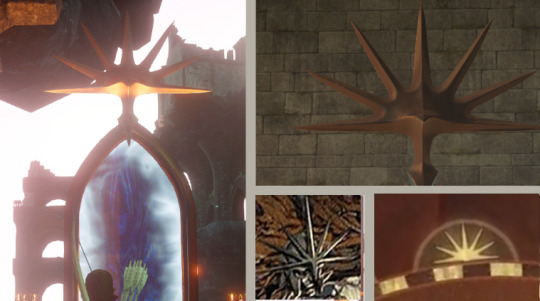
Strangely close to the Chantry Sunburst symbol, we find the “half” sun symbol [tagged along the blog as Sun-head creature] in what we suspect was one of the ancient primordial dragon symbols that some Evanuris took over when they claimed Divinity [for more context, read Attempt to rebuild Ancient Elvhenan History]. It’s hard to say which Evanuris took control of this symbol, but we know there is a clearly sun-like symbol present in the Crossroads of the DLC [as a statue, check The Crossroads [DLC Trespasser]: Entrance] and in the Shattered Library [as an Eluvian, check Shattered Library; Entrance and Courtyard]. With the release of the Vinyl, we also discovered and reinforced the hypothesis that this symbol belongs to or was co-opted by an Evanuris [read Speculations about the Vinyl Art for details] thanks to the image of an elf wearing a hat with that shape.
A consistent detail of this image is that it’s a half-sun with exactly 7 rays.
[Weak] Elvhenan Culture: Asterisk Symbol and Elvhenan Doors
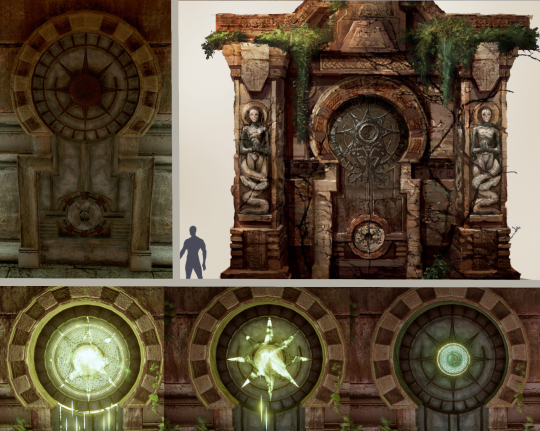
If we extend this imagery, and check other symbols that may look similar to a sun, we find the ancient Elvhenan Doors [Elven Ancient Shard-based door], which top displays a pointy sun of 8 rays that may or may not be related to the Asterisk symbols [also related to the Titan’s core, which I talked about in the post of Murals “The Death of a Titan”]. In the way the door gets illuminated when activated also makes us see a “circle” in it that can be loosely related to the “Golden Ring shape”. More details about this ring will be treated below.
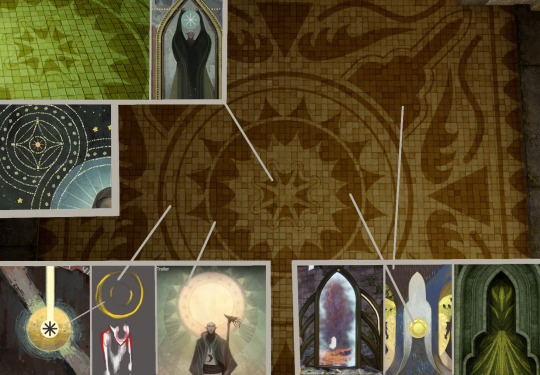
This strange sun on the ancient door also makes us think in the Asterisk Symbol [made of 8 points], which lays at the centre of the yellow mosaic, which may be related to the core of a Titan [asterisk of 8 points too]. The link is immediate when we see that this asterisk is outlined by a shape that looks like a star or a Sun, inside a big ball with triangular-shape ends. This same symbol appears in the last Trailer of DA4, behind Solas, when he is presented like an Hermit, mysterious, apostate mage. Around this “sun” we can make out several concentric lines that may refer to a “Golden Ring”.
The Asterik symbol also appears in murals such as “The Creation of the Veil” or “The Death of a Titan”, which allowed us to relate them with the core of a Titan and its immense power of "making real what you imagine"reinforcing the reality", but this symbol also appears in a corner of Solas’ tarot card.
The yellow mosaic also has some shapes at the four corners that may represent eluvians or something related to Mythal. In the mural of “the Temple of Mythal” from “The actions of the Inquisitor”, we see that Solas draw a particular star of 8 points inside a door frame that resembles this “eluvian outline”, but it’s also the shape of the doors of the Temple of Mythal which represents Mythal herself in her dragon shape. All these symbols seem to reinforce the idea we explored in “The Death of a Titan”: Mythal seems to be related to the core power of a Titan represented by an asterisk that evolves into a golden ring and into a sun.
As I repeated several times in Speculations about the Vinyl Art, at times, we find some hints where stars or balls of fires [also understood as suns] are related to Mythal and Elgar’nan, making us suspect that, maybe, Mythal and Elgar’nan share a nature similar to Falon’Din and Dirthamen’s: apparently, the same creature with two different aspects from them. If this were the case, associating Mythal with the Sun would make sense, and it would also explain why, if Elgar’nan was so central in the Elvhenan culture, there are so few representations and statues of him, while Mythal overwhelms it.
[Weak] Elvhenan Culture: Golden Ring
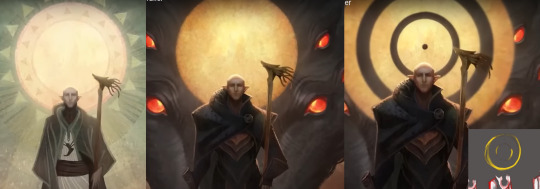
During the last trailer of DA4, we see Solas turns into the Black Dread Wolf as a sun in the background becomes a moon [single golden circle] and later, it separates itself into concentric rings, that may or may not be related to the “Golden Ring” so deeply entangled with Elvhenan culture. Thanks to this imagery, we may relate the Sun to the Golden Ring [specially if we consider that the mural presented in Nation Art: Elvhen displays the yellow ring in a position that may be considered “the sun”, but also the "authority/power above"]
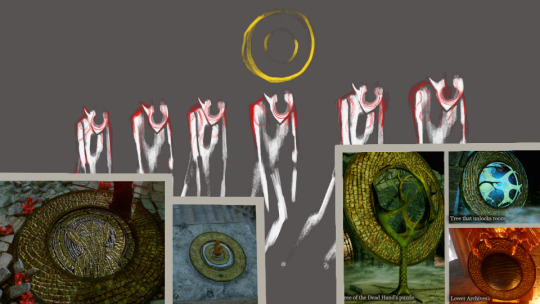
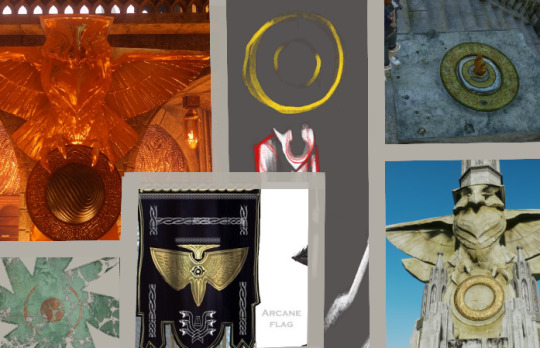
We need to remember that the Golden Ring’s presence is always associated with control, power, and occasionally to Mythal and Dirthamen. In the mural of the “zombie elves”, it’s above all of them, and due to this position, it could be interpreted like a “sun” or moon upon the controlled, zombified elves. But I’m not too convinced in this interpretation, since we already explored in posts such as: Nation Art: Elvhen, Exalted Plains: Ghilan’nain’s Grove and the Dead Hand, DLC: Jaws of Hakkon - Frostback Basin, Elvhen Tomb, Ancient Elven codices; Fen’Harel’s mountain ruins, The Crossroads [DLC Trespasser]: Elven Mountain Ruins; Vine-covered Tower, Murals in DAI: The Death of a Titan, and Speculations about the Vinyl Art that this ring was more related to control, power, or even forced change/shape in some cases. Due to its power or potential knowledge, it's also associated to Dirthamen Owl [which also could be Andruil's owl according some inconsistencies in the same Unreliable Dalish legends].
On the other hand, it’s never clear if this symbol may have morphed into a sun along the ages with the loss of memory that the Elves had throughout generations when they lost their immortality. However, I tend to consider that this Golden Ring may have changed into a Sun when it entered in contact with human groups, in the same way that I see the story of Fen'Harel gave enough context for humans to create the Maker myth based on him, potentially during the time of Halamshiral [for more details, read The Chantry and the Mythology of the Chant of Light]
This ring also appears in the last scene of DAI, when we defeat Corypheus, showing Mythal inside it, as bits of red lyrium sprout around it. This can be related to many speculations done in Speculations about the Vinyl Art, where we can conclude that another fragment/part of Mythal is still trapped in the Black City, corrupted, and contained by an immense power that may have been used before by the rest of the evanuris to control their own people.
The Golden Ring has also been seen enclosing Elven Tree Statues and Elven Orbs, implying its relationship with elvhenan power and/or Mythal’s [after all, we know that Mythal took the power from a Titan from which elvhen orbs were developed, and trees are also her symbol, according her vallaslin]. It's worth noting that the only working orb we saw in the game was Mythal’s, so far.
[Weak] Elvhenan Culture: Crappy Sun
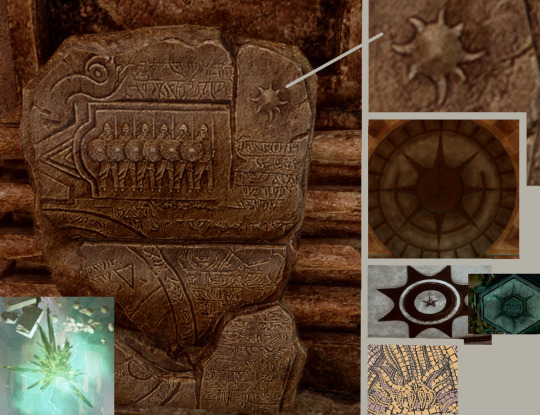
There is also a strange symbol that I called “crappy sun” in the ancient tablet we find at the entrance and deep into the tomb of Forbidden Oasis: Solasan Temple [along this blog I’ve tagged it as “Stone in Razikale-Ceremony-style”]. It’s hard to say if it represents a sun or a breach. It may be related to a sun similar to the one of the Elven Ancient Shard-based door that, later, Tevinter co-opted to turn into the several versions of pointy suns we see in Tevinter Pre-blight ruins, [let’s remember they were not Andrastian yet, and still they had this symbology in their buildings and elements because it may have been related to ancient dragons, or taken from another elvhen symbology during the time of the Dreamers since there are some proofs, such as the Tevinter Mosaic [Invasion], that may show that Tevinter had a better relationship with elves back then].
Maybe the original symbol was related to Elgar’nan, as we see in his mosaic, where he shoves down the sun into the earth, and its rays are wavy and a bit “crappy”. If this relationship is correct, maybe what Elgar'nan shoved into the Earth to destroy the dwarves/Titans was not a sun but a breach? Again, a very unlikely hypothesis.
This “crappy sun” also has 8 rays.
[Strong] Elvhenan Culture: Elgar’nan and Sylaise
Elgar’nan’s mosaic was interpreted in the post Evanuris, and basically shows an elf shoving down a Sun of wavy rays into the Earth. It’s easy for us to relate this image to the unreliable Dalish legend of Elgar’nan [read Elgar'nan: God of Vengeance]. Elgar’nan is presented here as the son of the Sun itself, who tried to burn all life on the Land out of Jealousy, so Elgar’nan vowed vengeance against his Father’s cruelty, and his rage won against the fire of the Sun. Then, “Elgar'nan threw the sun down from the sky and buried him in a deep abyss created by the land's sorrow.”
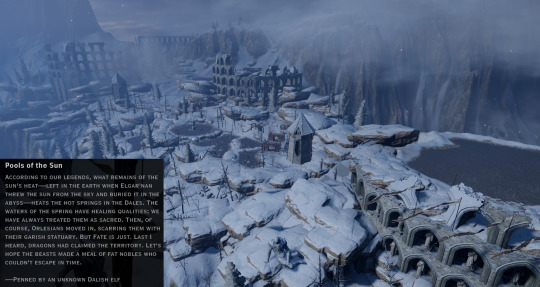
This story can be followed later in the post Emprise du Lion: Pools of the Sun, where we find another unreliable Dalish legend claiming that this place has spring waters because it was here where Elgar’nan shoved the sun into the Earth. I also made a link to Sylaise considering the Elvhenan arenas we can see in this region, the presence of Sylaise’s Shrine, and her thirst for being always competing with someone. These details can make us suspect that this Sun could have been Sylaise [so deeply related to fire, the sun, and also as angry as Elgar’nan according the Song to Sylaise].
It’s very worth noting that these two legends, said by different clans, claim that Elgar’nan pushed the Sun into the Abyss. Another detail we have to assume is that "Abyss", "Beyond the Deep Roads" and "The Void" seem to be one thing related to the places where the Titan sleep [or even inside the Titan themselves] instead of a strange dimensional pocket we never saw before. This links the Elvhenan with the Dwarven in what we speculated in Murals in DAI: The Death of a Titan.
With this relationship, we see again the Sun as a weapon of destruction and control.
[Weak] Elvhenan Culture: Murals
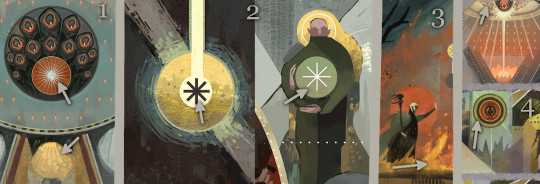
Murals present a red sphere with rays that may imply a Sun .
In the mural “The Creation of the Veil” [1], we find a red sphere inside a black one, making us suspect it’s the big evil released by the Evanuris that Solas isolated with the creation of the Veil. Around it, there are seven “bubbles” with similar “rays” in grey and golden colours that may imply “gates” that would allow us the access to the central “sun” or red sphere.
In the mural “The Death of a Titan” [2] we talked extensively about the asterisk symbol, its representation of a Titan’s heart and all that power associated with it, as well as with Golden Rings. The codex in here speaks of a red sphere that contains fury, and maybe all of this can be related to a sun, or better said, the other way around: a Sun as a sphere of fire, related to fury, and buried below underground to contain its destruction. This also brings us some similarities with the unreliable Dalish legends about Elgar'nan.
In the mural “Red Lyrium Idol” [3] we also commented how the image looks as if Solas were walking on a sphere of fire. It may be related to the red lyrium idol too. Here, we keep linking this idea of a “sphere of fire” as a potential Sun.
In the murals of “The actions of the Inquisitor” [4], we see several times that the red sphere associated with the big evil isolated behind the thick, impenetrable barrier of the Black City seems to be positioned in places that may allow a soft interpretation as a “sun”in the sky.
These symbols seem to gather more importance as we analysed the Vinyl Art, where we find the concept of the Eclipse [as an ominous symbol of Fen’Harel that covers and hides the Sun] and a lot of iconography of stars, which can be interpreted as “suns”.
[Weak] Tevinter Culture: Green Star

Pre-Blight Tevinter art has a “star” symbol that may be interpreted as a sun, specially if we consider that the inside of this green star displays the symbol of the elvhenan Golden Ring in red colour. However, it seems more likely to be a symbol representing the power that one can extract from the Breaches. The green colour helps in this interpretation and puts it a bit farther away from a sun interpretation than other symbols. However, it keeps linking the Golden Ring with the power of creating a Breach.
[Confusing] Tevinter Culture: different decorative elements
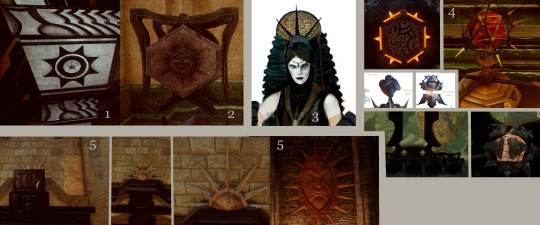
The rest of the symbols in Tevinter objects may have some relationship with the Sun. For example, we find doors, boxes, and columns decorated with an 8-pointed star [1] but we also find another one with 6 points in something that looks like a box [2]. The shape of an “hexagonal” sun of 8-pointy rays can be found as well in objects like the “scrying orb” [4].
Among the outfits, we find a 3-ray comb used by Tevinter women [3], which may be related to the sun-based symbol of an Old God [and potentially related to the corresponding Evanuris associated with it]. This symbol is a lot closer to the "Sun-head creature" we found among Elvhenan objects.
As a curious one, I will always point out the strange, hidden Sun figure that belongs to the Free Marches decoration that can be found at the entrance of the Inner Sanctum in Western Approach: The Still Ruins, Viridis Walk and Inner Sanctum.
I think it’s clear and safe to say that most of the sun-based symbols present in Tevinter culture [and previous to their conversion to Andrastian religion] may have been originated from the contact with the Elvhenan [during the Dreamer time where we can see less repulsion to Elvhen according the Tevinter Mosaics] or [most likely] with the dragons that may have been related to the Elvhenan, as I made the connection in the comic post The Missing.
[Weak] Dwarven Culture: Fairel and Dwarven art
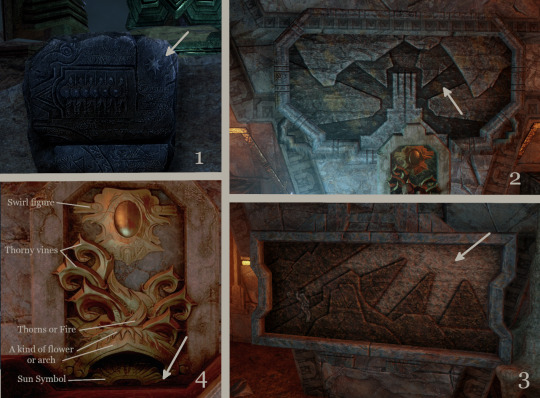
The Dwarves, at least the ones in the Fairel’s ruins, may have some link with the Sun as well. In these ruins we find the same exact stone tablet we find in the Ancient Elvhenan tombs [1], which displays the “crappy sun” I commented above. Once again, it could be a sun but also a breach, so there is no much sense to keep focusing on it.
Another symbol to relate the Sun to the Dwarves may or may not be an old “Dwarven stone-paintings” we saw since DAO, which basically shows a dwarf working the stone [3]. Based on symmetry, we could assume that the triangles on the background are stalagmites, but if we stretch-out this interpretation, they could even be seen as a sun with its rays. It’s very unlikely, since it seems to be more a design resource to highlight the scene of the stone-painting, but for completion’s sake I think it’s worthy to keep it commented here.
However, this simple design allows us to interpret it in different ways: the spikes we see can be pieces of rock protruding from the ground and the Dwarf in it is mining them [as its original codex in DAO seems to imply], but also it could be understood as a quarter of a Sun peeking through the corner of the image as a Dwarf works tirelessly.
Later in DAI we are introduced to another piece of art of similar characteristics [2]. The building was never possible to be identified unequivocally, and in posts like “Architecture of Kirkwall : Gallows and Lowtown/Darktown” I related it to representations of Kirkwall or cities that may be similar to Kirkwall where the runecraft mastery of dwarves was used [and probably, it was a source of pride for these clans, who may have kept the achievement immortalised in a piece of art reproduced among the noble dwarven families]. This piece also shows a background very similar to the one in [3] that may be a representation of stalagmites or a sun, if it’s stretched-out enough.
Another strange symbol in the dwarven furniture is the one presented in some stone-seats: an elaborated metal image that shows thorny vines on or over a sun [4]. This symbol appears in many other parts of the game where there are dwarven rooms, but also in Arbor Wilds :Cradle of Sulevin where we can read the Vir Tanadhal, However, in this case, the symbol is not completely the same one than in the Hissing Wastes: Fairel tomb.
It’s hard to suspect if this is a mere reuse of assets, it has a lore-related meaning, or it’s just a reflection that the Dwarves and the Ancient Elvhen had a relationship quite ancient [as it shows the Elvhen tree and its dwarven, more geometrical style, that I’ve been pointing out since DAO in Orzammar]. We have to remember that the Ancient Elvhenan saw the dwarves as soulless creatures, workers of the “pillars of Earth” and worthless. However, I always claimed it was never clear if this was a reference to ancient Dwarves that were linked to the Titan deeply to the point that they became Sha-Brytol after the break of the link, or were related to more independent dwarves as the ones we see now, who have a sense of Stone, but can’t understand the Titan with the exception of some gifted ones [such as Valta].
Finally, the dwarves have an additional aspect related to the Sun in the very unreliable codex called Torn Notebook in the Deep Roads, Section 2. I wrote about this codex in a more integral way in Deep Roads [DLC Trespasser]: Lower Walkways. But basically an ex-Dalish elf [now a Qun converted] relates Elgar’nan’s fire [which another unreliable Dalish legend, Elgar'nan: God of Vengeance, claims he shoved the Sun into the Earth] to the fear to the Sun that Dwarves experience [Read the section Elgar’nan and Sylaise above]. This may have been a Dev’s choice to makes us aware that there exists a relationship between the Sun and the dwarves, even though there is no lore material that can make it clear enough.
[Strong] Ferelden Culture: The Sun Face and the geometrical Sun

In the Tryptich presented in Andrastian Design: Tapestry and Tryptich, we find three symbols on top of each part of the scene: the six-snakes that represent Tevinter, the golden city above all the image representing the Maker or the Chantry Religion, and over the section of Ferelden/Orlais chantry, a 8-pointed sun which rays look like triangles. Once again, the resemblance of this symbol with the elvhenan sun in the mural “Temple of Mythal” is remarkable [check the Temple of Mythal in “The actions of the Inquisitor”] or the sun shape in the elvhenan yellow mosaic or in the background of Solas in the Trailer of DA:D. This could come from different roots:
1- An Orlesian root, considering how much of the elvhenan influence it had during the time of the Halamshiral and the coexistence of humans and elves in the Dales for some years [to the point where inter-racial families were made, as it was hinted all over the Exalted Plains]. I spoeculated how the idea of the Maker may have been developed during this time in the post The Chantry and the Mythology of the Chant of Light
2- Another potential root is related to the Alamarri root, and therefore, linked to the Avvar: this sun may be a representation of the Lady of the Sky for the same reasons I will explain below in the Section Avvars and the Sun.
We can find similar icon in the book World of Thedas, where they show a unique Ferelden Tryptich [3], which top displays this symbol with a sun that even may have a shape of a Golden Ring within it. In either case, we know that this symbol later was part of the Ferelden Chantry, which sun is very pointy, as DAO showed it [see the first section in this post: Chantry Sunburst].
In DAI, we find in some small towns of Ferelden, a unique strange Sun with a crying face [1]. On it we see a bird and a squirrel. It’s hard to know exactly what this is, [check the post Nation Art: Ferelden], but maybe it can be understood as a representation of Andraste made by Ferelden culture mixed with some local animals and fables created as a mixture of cultures, similar to the tale that related Wyverns to Andraste [check the wyvern section in Dragon Age Iconic Patterns: The single spike].
There is also a fish drawn in the DLC of Hakkon on a fisherman shack [2], which displays a pattern that can be related to the “crappy sun” designs on its skin. Not sure what to make about it. The closest is that the Avvar represented this symbol as a way to reflect what they may have seen in the Isle of the Lady, where a big ancient breach have been there, open, since the time of Telana [read about this in “The Veil and the preservation of the Waking World” from the post Frostback Basin [DLC]: Miscellaneous ].
[Strong] Grey Wardens and the Sun

The typical symbol of the Grey Wardens involves a chalice that represents the Joining ritual. It always displays a Sun, and not any sun: it’s one with a strong resemblance to the Sunburst of the Chantry. Let’s remember that the Grey Wardens was and is an independent Order that doesn’t respond to the Chantry, and even more so: it was created before the existence of the Chantry, and before Andraste was born. So any quick explanation that this sun is present in this object due to some potential influence from the Chantry seem unlikely.
However, as I showed in Western Approach: The Still Ruins, Main Chamber and Hall of Silence, there are griffons with this same chalice that belonged to pre-Blight Tevinter, maybe remotely associated with Dumat in some ways [since they appear in a hall called “Hall of Silence”, and Dumat=Silence]. We know that the Joining, as a ritual of blood magic, came from the knowledge of Arlathan elves and Tevinter Mages during the desperate times of the First Blight when nothing seemed to stop the darkspawn and even slaying Dumat did not work the first time. Therefore, this Sun may have some relationship with the elvhenan, the Old Gods, or just the blood magic that allowed the creation of the Joining.
[Curious] Avvar and the Sun
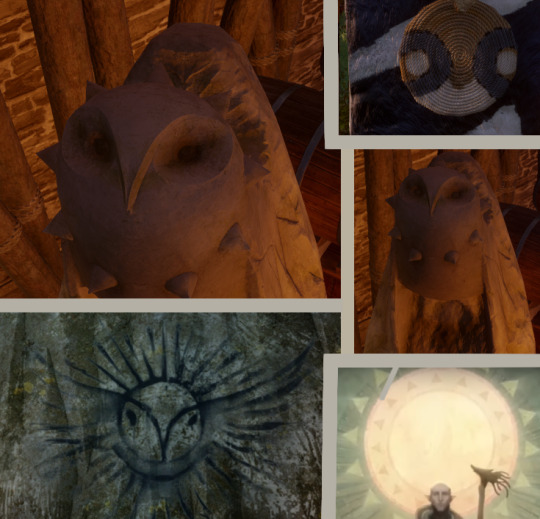
The Avvar have a symbol that I always found very Sun-like due to its design and cultural concept: The Lady of the Sky. It’s not only the concept; the lady of the sky can be any important object in the sky; moons or suns. Since Thedas has two moons, it seems more plausible to think of her as unique as the Sun itself.
In the painting that represents her (found on a wall in the Frostback Mountains) we see a design of an owl which shape looks like a Sun. Even her sculpture in Skyhold displays small spikes around her neck which give her a low-key “sun-like” design, specially if we relate this shape with the “sun” shape we saw in the Ancient Elvhenan Yellow Mosaic or with the star we saw in the “Temple of Mythal” mural [in “The actions of the Inquisitor”] or with the Sun that appears behind Solas in the trailer.
Curiously, her banner displays her eyes in a shape that looks similar to the Golden Ring shape, but in black colour. That the Avvar have an art that may have resemblance with Elvhenan's is not strange for me if we remember that Tyrdda Bright-Axe Path’s story narrates that her lover was an elf that, as it is hinted, may have been the Lady of the Sky herself. This means that the Avvar always were a culture under the influence of the Elvhenan and the Dwarves [due to the marriages they arranged with the children of the Stone].
[Weak] Flemeth
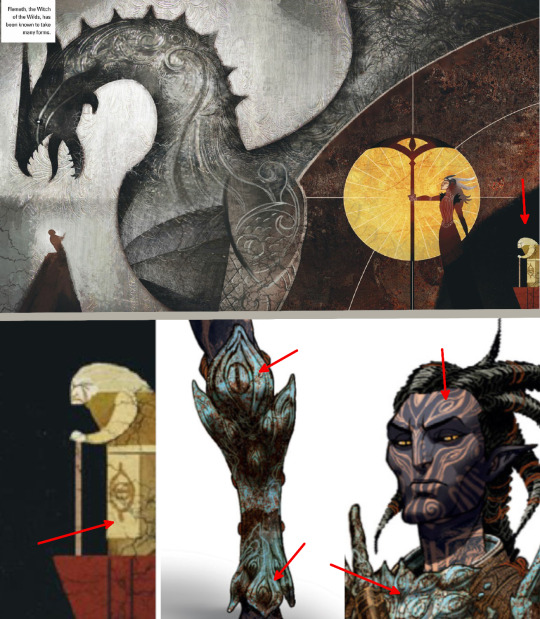
Flemeth also had a unique concept art that shows all of her nature in one drawing: her dragon shape, Mythal, as the central part of it over a human figure that may be a petitioner; a bit aside and as if she were in a inner ring of a brown sphere, The Witch of the Wild: Flemeth, with a very particular staff inside a yellow circle that may be interpreted as a Sun. And very hidden in the corner, in the core of this sphere, now black, we see her as an "old, old woman" with a big eye drawn on her apron, at the edge of a cliff [potentially representing the fragment of Mythal that lives inside her]. This kind of eye is very similar to the ones that we see in the concept art armours of Mythal’s temple guardians. I assume it has to do with her omnipresence due to the manipulation of dreams [we know that she presented herself in dreams to an elf and marked him with the Vallaslin of Mythal after awakening, check the video]
Mythal also has bland hints related to Elgar’nan symbology, which is related to the sun, fire, and balls of fire with anger [check all this in the posts Speculations about the Vinyl Art and “The Death of a Titan”]. Flemeth ends up being related to all this since she carries a fragment of Mythal in her.
[Strong] Qunari, Par Vollen, and the Solium Constellation
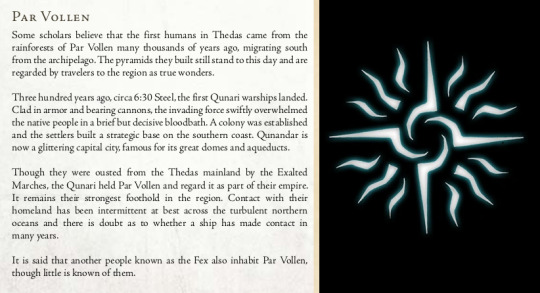
The Qunari have little link with the Sun, but not the land they conquered. In the book World of Thedas we are informed about the existence of the Fex, a race we never saw nor had much information beyond the fact that they exist. May they be related to the Sun or a Sun-base proto religion? We don't know.
In the Codex Constellation: Solium, we learn that this constellation [which looks like a Sun/Star, image above, pretty similar to the Chantry Sunburst I may add] may have been a representation of the Sun or the Moon [or both] for the Neomerian [Ancient Tevinters], however, it could also represent Elgar’nan, since unreliable Dalish legends claim him to be the “eldest of the Sun”.
Another Codex, called The Pyramids of Par Vollen, tells us that the Jungles of this continent have ancient ruins that doesn’t seem to be tombs but places of scientific purposes. The shape of these ruins fits perfectly with the constellation of Solium, making them, in some way or another, related to the Sun. These pyramids are a great mystery in the DA lore, especially for their total lack of information beyond this codex. We know their walls show images of “intricate sea creatures, shipwrights, musicians, archers, and kings. Odd figures are depicted, tall, horned, always in a position of authority and respect.” It seems that there was no resistance when the Qunari came to conquer this place, so we can suspect that this previous civilization embraced the Qun without much resistance, in part, because the Qunari have horns, and that caused respect and authority. Or the civilisation had been gone long ago when they came. Or it was a civilisation that was developed by or under the authority of the Kossith, the ancient Qunari who had no Qun.
The brief description of these ruins also makes me link it, potentially, with the underground ruins we find in The Horror of Hormak .
[Confusing] DAO design
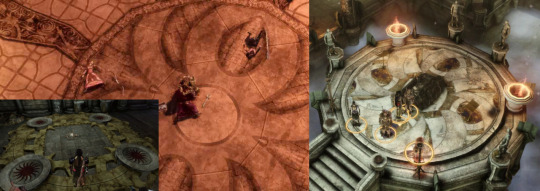
This section tries to relate the Sun shape with designs that may make the connection a bit stretched or not truly reasonable, therefore, DAO leads this part, lol.
We find that many places along the game, specially the ones related to puzzles [Honnleath and Enchanter Wilhelm’s basement] or to Tevinter experiments [Ruins of Brecilian Forest] display a platform on the ground with a symbol similar to the Sunburst of the Chantry. I’m not sure why they are there, specially in the Brecilian Forest, since we know this was a fortress probably developed by Tevinter [ which potentially may have co-opted, as usual, an ancient Elvhenan building and claimed it as its own] just to be taken by Dalish and humans later. This Fortress is a mess in terms of design and statues that it displays, so it’s hard, if not impossible, to truly take it seriously. To me it all feels more like a reuse of graphical resources, but just for the sake of completion, I add the present section.
More of these sun-like platforms can be found in the Tower of the Circle of Magi [which could potentially make sense since the tower was made by Avvar and Dwarves, and it may be a representation of the Lady of the Sky, as we saw in the Avvar section of this post] but also in the Temple of Andraste or in Denerim at the Fort Drakon which makes less sense [unless it is taken as a symbol from the Chantry itself]. Again, these inconsistencies make me suspect the reuse of assets in a game that could not afford to have 5 different platforms designs.
[Confusing] Free Marches Rural Areas
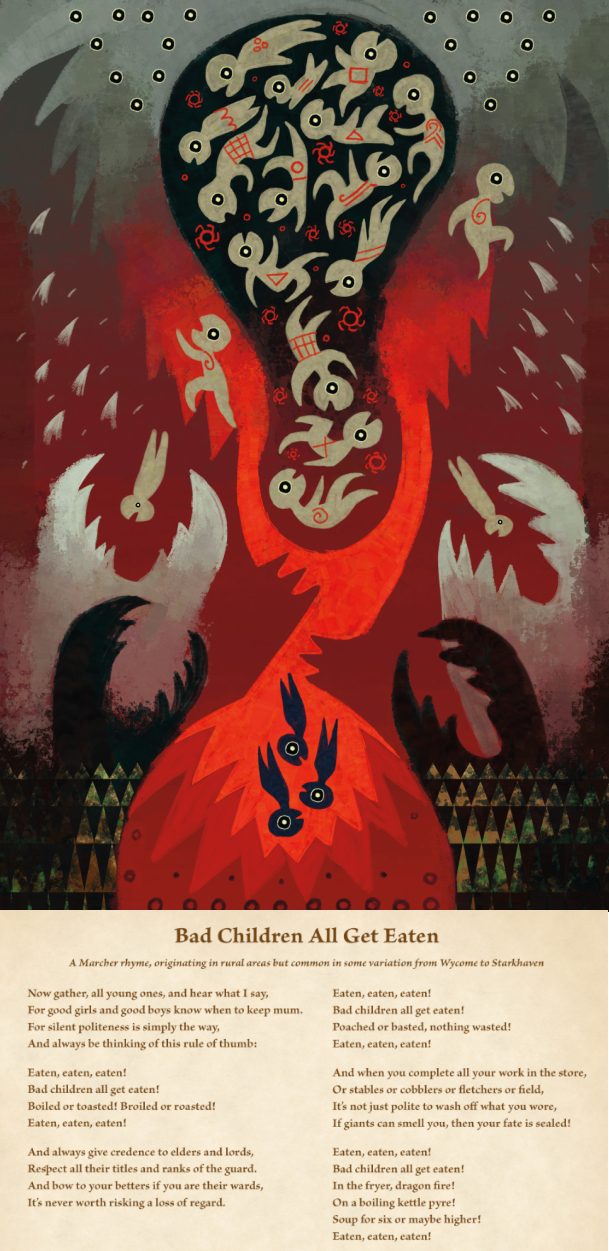
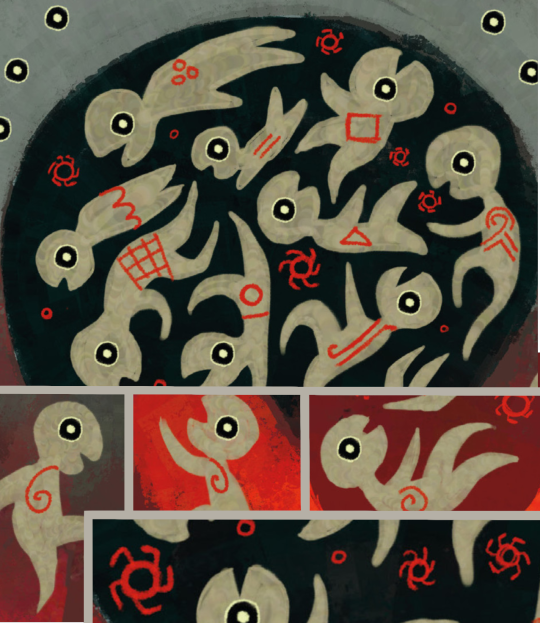
Another place where I found a sun-like symbol was in a very disturbing image of the book World of Thedas associated with a cautionary tale told to Free Marches kids. In it, we see that people/children are punished if they go outside a bubble of darkness with small “sun-like” symbols floating around. Each of these kids have a symbol on their belly or head. Curiously, one of these symbols is a small spiral that I’ve brought the attention upon long ago in the post Hinterlands: Statues, paintings, and structures found in the open where we found the alamarri statue I called Eroded dragon skull which has a “G symbol” on its back, which, at the same time, seems similar to the one present in a reiterative way all over the elvhen artefacts and in some dwarven rug designs.
I don't know how to interpret this image, mostly like the big black bubble that contains these klids seems to protect or shield them from the dangers outside. The kids that "behave badly" are dropped outside of it and are consumed by the dragon fire/jaws of the dangers outside. So in a very stretched way, we can interpret this image that the bubble filled with Suns protects people, or at least, it's the right path to follow not to be eaten by those monsters outside.
Conclusions
To put an end to this post, I would like to bring a short conclusion that we may have reached together along it. The Sun in Thedas is an ancient symbol that mostly every culture took to exploit and use in their own representation of gods/power.
This fact alone is not strange, since in anthropology we can see that severals cultures on Earth have developed religious rites or created Gods out of the Sun itself. The Sun is a symbol related to warmth, light, food, life, and security, so it seems reasonable for DA Lore to take it as the main symbol of Thedas civilisations.
The Sun in current Thedas is immediately associated with the Chantry and Andraste: it is a symbol of hope, of dawn, that provide the idea of new beginnings; it’s also the idea of the Maker itself and the Faith people have in him. It's also the fire that purifies in order to grant ascension [Andraste's case].
When it comes to Elvhenan, the Sun is immediately related to Elgar’nan, who was considered, according to the underaliable Dalish legends, the son of the Sun itself, who in order to save the Land shoved the sun into the ground, potentially causing a great damage to Dwarves and Titans.
There is also a symbol of a half-sun in an Eluvian, a statue, and in a hat worn by an elf, that may suggest that an original god, represented by the sun [potentially an ancient Dragon] was worshipped by the Evanuris. Lately, that symbol may have been co-opted by one of the Evanuris when they took divinity and the identity of the ancient gods they worshiped.
Elvhenan also seem to take the symbol of the asterisk as an oversimplification of the Sun, which across the murals, is also related to the heart of Titans, to power, and to the Golden Ring, which is also associated with control. So, for Elvhenan, we may suggest that the Sun represents immense power, if not, Divinity itself, that may end up being related to the core of Titans. The asterisk is also associated to the orb, a big power object.
Since Elvhenan were the first civilisation we know that started in Thedas [besides the Titans and their children], their symbols of power [asterisk, orb, golden ring] may have evolved along time to reach human groups which developed, later, all the sun symbols that ended up in the Chantry’s.
Thanks to Tevinter, we also can suspect that the Sun may have been a representation of an Old God, since they have a lot of sun-related images in their decoration and objects that belong to ancient times in which they were not Andrastian yet [in fact, so ancient times that Andraste herself was not born yet]. This may mean that the Sun symbol cloud have been taken from the Elvhenan or from the Ancient Dragons. Through Tevinter style, we also realise that the Elvhenan Golden Ring may have been used to create Breaches, which again shows and seems consistent with the idea of relating it to power and control. The symbol of Sun in Tevinter culture may be related originally with Elvhenan or with Ancient Dragons that Tevinter used to worship.
Dwarves have little representation of the sun for obvious reasons, but due to the unreliable legend of Elgar’nan and the war with the Titans, we may establish a relationship in which the dwarves endured the Sun [or the Elvhenan power] at some point in their story.
Thanks to the Grey Warden we can relate a sun with the idea of ancient Blood magic or ancient Dragon blood knowledge, since the Joining is represented by a chalice with a Sun on it.
The Avvar also have a low-key representation of the Sun in their Lady of the Sky, which may be just consequence of their deep relationship with the Elvhenan culture.
Par Vollen may have more answers about the Sun and ancient times, but the lore of DA world is very scarce on this region of the map of Thedas, so we can only speculate.
#Analysis and speculation of Statues#golden ring#alamarri#avvar#Chantry#Dragons#Elvhenan#Flemeth#Grey Warden#High Speculation#Old Gods#Tevinter#Par Vollen#sunburst#Sun-head creature#evanuris#Elven Ancient Shard-based door#yellow mosaic#mythal#flemeth#Elven Owl statue#Stone in Razikale-Ceremony-style#Sylaise#Elgar'nan#Asterisk Symbol#Free Marches Sun#Dwarven stone-paintings#lady of the sky
76 notes
·
View notes
Text
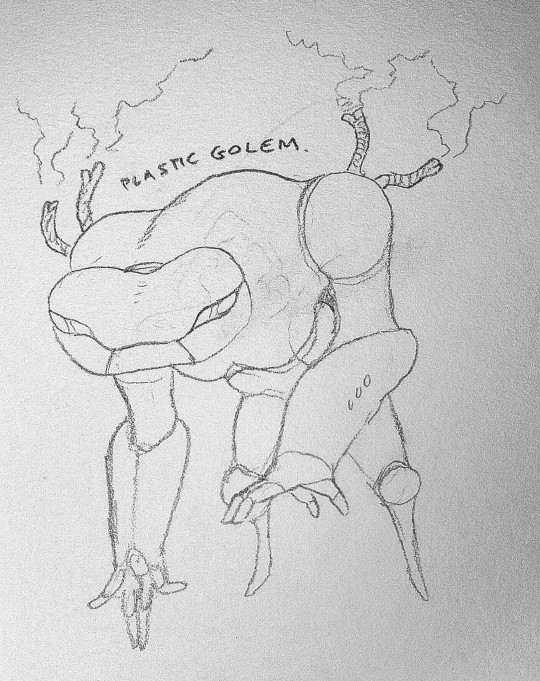
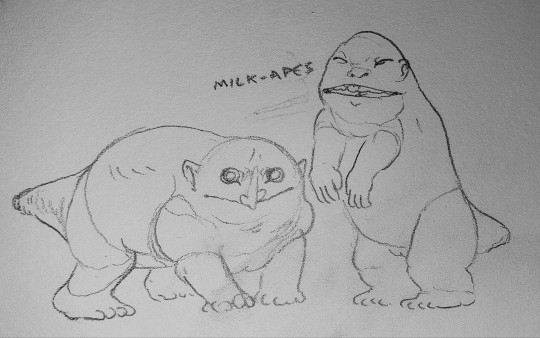
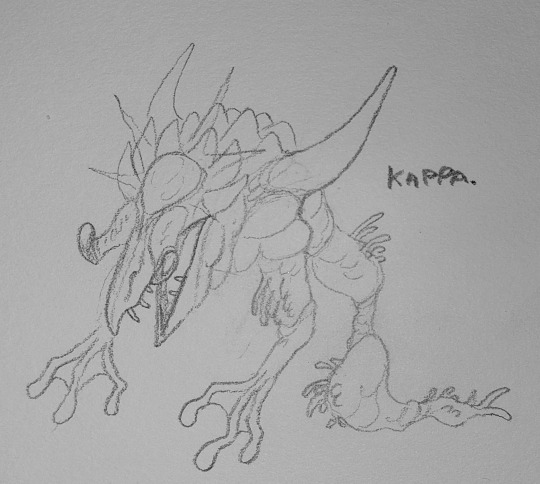
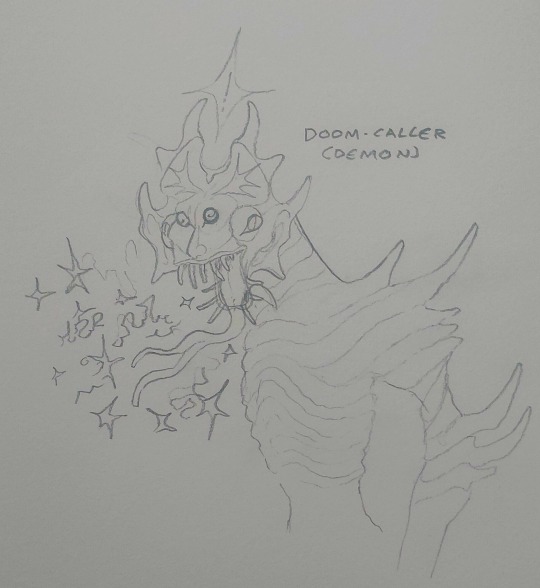
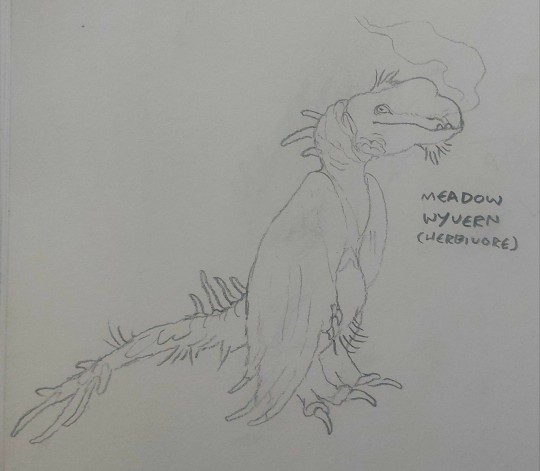
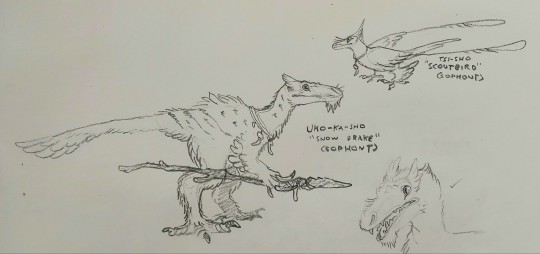
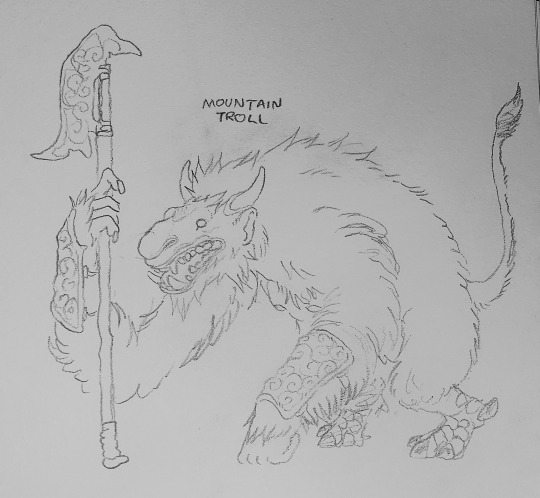
Some developmental sketches for ohm and the ineffable sea
Plastic golem, milk-apes and the kappa are from the radiation and plastic-poisoned world beneath Uton, the gaoled sun (there are about 7-9 suns in the ineffable sea, sources of different magic and all said to be siblings of one another)
Demons are from another sun, which is partially exploded
The other creatures are from Ohm, under the sun Xol (creator of the celestials and dragons)
(Send me an ask if you're curious about anything from Ohm)
#ollyneanderthal art#fantasy art#fantasy#high fantasy#illlustration#fantasy illustration#speculative biology#speculative zoology#xenobiology#demon#alien design#golem#monster art#creature design#monster design#kappa#troll#dinosaur#homunculus
249 notes
·
View notes
Text
I don't think Kipperlilly has a crush on Riz. I think she has had a one sided rivalry this whole time and has probably been doing as well as Riz has in school but is pissed that Riz has so much more accolades than her as a rogue. Bet she's seething that Riz found the rogue teacher the way she was designed to be found using proper rogue tactics.
#fantasy high#dimension 20#fantasy high junior year#fantasy high spoilers#riz gukgak#kipperlilly copperkettle#theory#speculating
261 notes
·
View notes
Text
I'm just waiting for Telemaine to wind up serving the next bbeg on accident. Man knows fuck all about the outside world, and you put him in Elmville? He's gonna invest in crypto and go into the deepest debt that no one will know about until Seacaster Manor has loan sharks pounding on the door.
#hes already a hippie but suddenly drop him into the modern world and hes gonna be make all the worst choices#dimension 20#d20#fantasy high junior year#fhjy spoilers#fhjy#fantasy high#fh#i just realized senior year would also be fhsy yall what are we gonna do when the time comes#i need my acronyms#fhjy speculation#fantasy high senior year#telemaine lomenelda
160 notes
·
View notes
Text
every day i wish there had been a better solution for the qin su marriage problem.
in my fix-it fics i either have some other sect leader claim that he was actually madly in love with her this whole time and sweep her away for jgy's sake, have her mom confess earlier, make jgy decide to tell her for her own good and have them work together, or not give them a chance to meet and fall in love in the first place (i guess i could also make qin su have a miscarriage, but that's really sad and awful and not my preferred option at all), but all of those require tweaks to the circumstances, sometimes early on so they don't meet or jgy feels safe enough to talk with her or another confidant, or sometimes later like madam qin finding out they're pregnant before the marriage prep is too far along and telling one or both of them right away so they can make other arrangements.
with the situation being what it was, jgy didn't find out soon enough to do anything that wouldn't involve either marrying her anyway (and he didn't think telling her about it would do anything except make her upset and depressed) or leaving her essentially a ruined woman with no prospects and an illegitimate child who would inevitably grow up fatherless, which is pretty much exactly what his dad did to meng shi. this would be a crueler option than pretty much anything else, and given that he clearly still cares about her, he couldn't do that in good conscience. jgy tries his best to protect the people he loves, unless there is literally no other way for him to survive.
it's one more example of jgy being faced with a situation where the only choices are bad ones, and making the decision that he thinks will hurt the fewest number of people. metatextually, it's one more example of women in fiction being shoved aside and not given agency in their own lives, and getting killed off instead of surviving and growing as people like the male characters are allowed to do. it's just a tragic situation all around and i wish there had been something they could have done.
#the untamed#mdzs#mo dao zu shi#cql#chen qing ling#grandmaster of demonic cultivation#jin guangyao#qin su#mxtx#mo xiang tong xiu#yunmeng bee posts#this encapsulates the tragedy of jgy's life in a lot of ways imo#there's also the aspect of jin rusong - jgy believes there's a chance of him being born disabled in a way that would suggest incest#which would spell disaster for not only him‚ but also qin su and rusong himself#the few academic articles i was able to access (aka not behind a paywall) suggest that the penalty for incest in ancient china +#+ was public execution of both parties! jgy emphatically does not want that to happen to either himself or qin su!#now i don't know how likely it would be for jrs to have some kind of condition that would make people suspicious#(i've done some research on it bc i was curious‚ but it was either vague‚ behind a paywall‚ or too technical for me to understand haha)#but jgy is (justifiably!!) paranoid. people are already gossiping and speculating about him - this would ruin him‚ his wife‚ his child‚#and possibly his friends too#whether you believe he killed his son or not‚ you have to admit that letting qs carry him to term was an incredibly risky decision#and i think it was because he loved her. he wanted her to have the child she wanted.#if she couldn't have a husband who couldn't be around her without fear & distress‚ she would at least have her son. he wanted that for her.#it would have been so easy for him to slip her an abortifacient‚ or to smother the baby while he slept or give him poison#and blame it on the kid being fragile/the high death rate in children. i don't think they knew what sids was but sometimes babies just die#because he didn't kill rusong in utero or when he was a newborn‚ i find it unlikely that he arranged rusong's death years later#but everyone can have their own opinion on that i guess#again... if jgy was as awful as people seem to believe he is‚ he'd have just murdered his way out easily and survived the book!#his love is his downfall!!!
89 notes
·
View notes
Text
i think lucy died not so she could come back and become the champion but so porter could get her out of the way. put aside that she's a frostblade and put aside her clear devotion to ruvina. she's the person that kipperlilly was "very fond of" and she was a kind person, the type of person who brought rats back to life. she had kipperlilly's back and supported her when no one else did. take her away and kipperlilly is alone. take her away and make it clear that she chose oblivion instead of being at kipperlilly's side?
kipperlilly's isolated at school and she's isolated within the rat grinders and she's even easy to twist into what porter needs her to be. he believes in her after all, believes she can do it, and not even lucy had that much faith in her, right?
#fantasy high#d20#fantasy high junior year#dimension 20#fhjy spoilers#fhjy speculation#kipperlilly copperkettle#lucy frostblade#dimension 20 fhjy#d20 fhjy#fhjy#frostkettle
429 notes
·
View notes